#jjk meta
Text
it's established that gojo's blindfold is a hallmark of his character. it's understood that the blindfold keeps things out; however, i also think there's something to be said about how it also keeps things in. despite the fact that there's already a lot of discourse regarding his blindfold, i think there's more to it than meets the eye (or doesn't, in the case of gojo).
this is going to be somewhat of a long post, but i promise that if you stick around, the end will make the journey worth it.
(this analysis is the lovechild of mine and @chiarrara, whose sexy big brain sponsored this whole thing).
as a character, gojo is unknowable without his eyes. it's very much proposed that gojo is his eyes; he's even repeatedly referred to as "the six-eyes brat". he's the strongest, and his eyes embody that status/symbol/role in the narrative. his eyes and his character are so intertwined that they almost become the same thing.
we are repeatedly reminded of his eyes throughout the story; they are perhaps his most distinct and identifiable feature. when we're shown the progression of gojo's life from birth to adolescence, we only see his eyes.
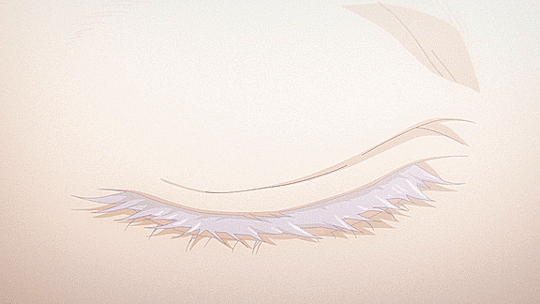
during this scene when toji is remebering him, he repeatedly refers to him as the "six-eyes brat". he is his eyes, and nothing else. that's the only thing that toji knows about him because to the jujutsu world, that's all he is.
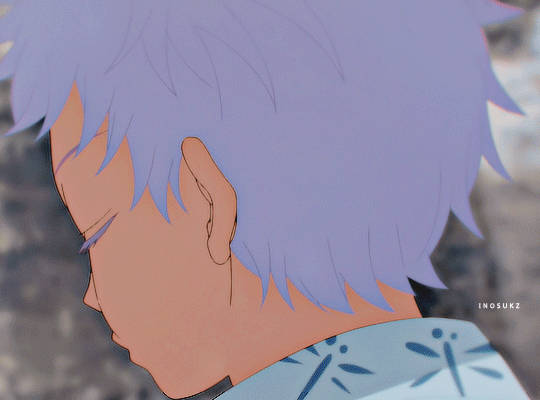
however, when he's a teenager, although his eyes are more present than we've ever seen them throughout the series, they're noticeably un-glorified. they're undeniably present but they're unremarkable.
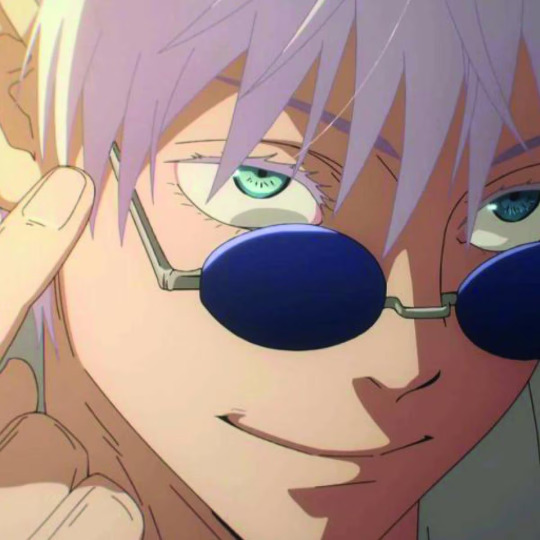

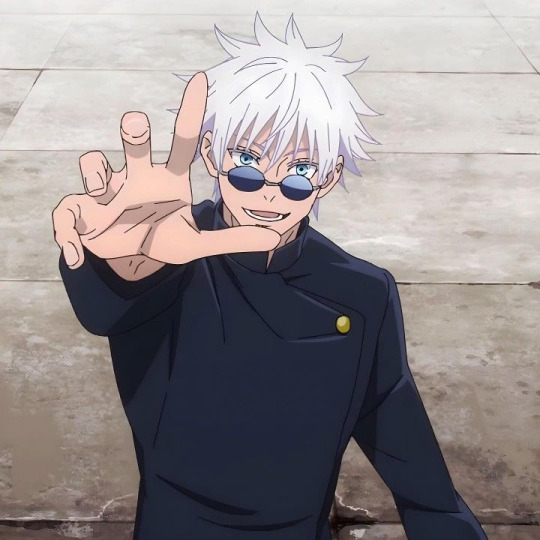
they're less symbols of his power and more what they are, which are just eyes. we see glimpses of his eyes so often that we almost forget that they're special, until he steps into his role as the strongest and reminds us of them.
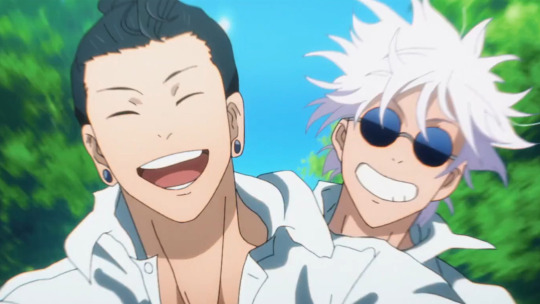
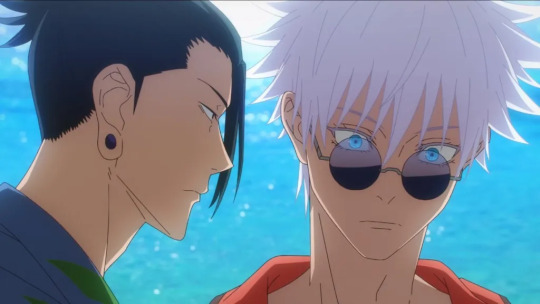

it's important to note that what sets the depiction of his eyes apart here (versus when he's an adult) is the presence of geto. if you comb through every single scene with geto in hidden inventory, you will find that gojo's eyes are not the focal point of his character. they're backgrounded features; his eyes are either half-hidden or entirely obscured by his shades, and they rarely glow.
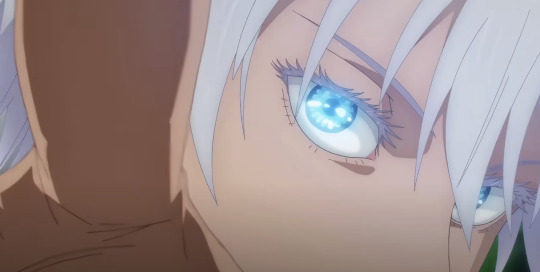
his eyes make themselves known when geto is absent, like during gojo's fight with toji. in these moments, he is the strongest, invariably leaving room for nothing else. the only exception to this rule is when he's carrying riko's body, in which his eyes glow when he toes the line between human nature and godlike power. if we understand his eyes to be conduits of his power, then their noticeable downplaying can be understood as gojo leaving behind his title as the strongest and stepping into his humanity.
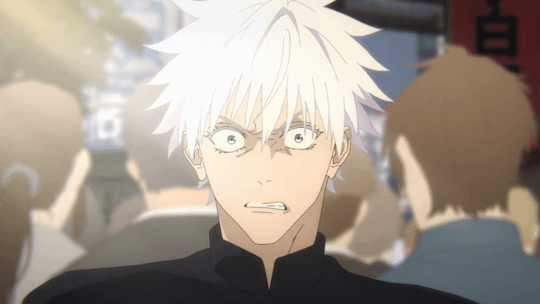
when geto breaks up with gojo, his eyes are not only uncovered, they're un-emphasized. they're perhaps the dullest we've ever seen them, and their distinct, eye-catching blue is swallowed by the whites surrounding his irises. his strength and power don't matter in this moment, and his eyes reflect that. when he's losing geto, he is not the strongest; he is purely gojo satoru.
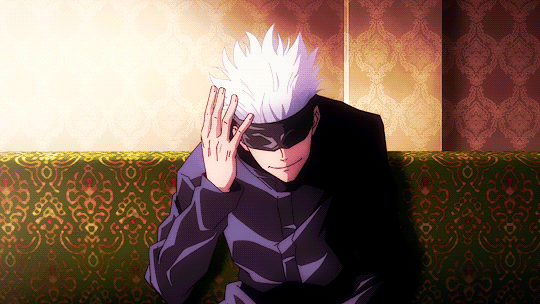
the emphasis on his eyes in his youth makes their absence in his adulthood even more stark. we rarely see his eyes now, and it's only in the direst of circumstances.
everyone is familiar with the dictum '"the eyes are the window to the soul", which is true: eyes let people see into us. however, they function both ways; like a two-way mirror, they also let us see the world. eyes let people look in, but they also let their beholder look out.
there's a reason gojo only put on the blindfold after geto left. why didn't he wear it from the start? why did he start wearing it at all? all the credit to @hijinks-n-lowjinks for their masterful analysis that inspired this idea, which is as follows:
"....Gojo wants nothing more than to leave the memory of Geto unscathed....There's still a part of Geto's memory that's untarnished if he keeps it private instead of exposing the depth of Geto's crimes to the students, and I think that's what he's clinging onto."
gojo wears the blindfold for two reasons: one, to keep people out, and two, to keep geto in.
in donning the blindfold, gojo seals geto in his mind and simultaneously seals himself off from the world. he holds geto inside of himself, rendering him (or gojo's construction of him) untouchable by anyone else. in order to achieve this, however, the practice necessitates that gojo keeps everyone else out, because they belong to a world without geto that gojo literally and figuratively refuses to see. the wall functions like eyes: twofold, both keeping in and keeping out.
geto can be understood as gojo's blindfold: he is the reason it exists and why gojo put it on the first place. the blindfold is an intractable element in how he (doesn't) navigate the world without geto, because geto's departure from his life catalyzed his withdrawal from the world, which is symbolized through the blindfold.
when geto was in his life, gojo let the world in because it had geto in it. after geto left, he wasn't there for gojo's eyes to find. the permanent blindfold operates like schrödinger's cat— instead of seeing a world without geto, gojo simply chooses to stop seeing.
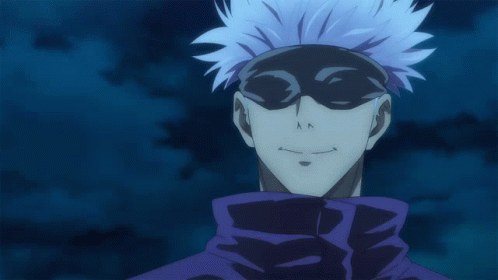
it's worth noting that the literal barrier pairs with the figurative barrier gojo puts up, which is in his disposition.
there's a reason that gojo's cocky, lighthearted persona comes out when he's wearing the blindfold. it's a figurative barrier that matches the literal one. like i said before, we only see his eyes in the direst of circumstances, and his goofy, cocksure demeanour is notably absent from these instances. i'm not saying it's fake, but the persona is a front, designed to keep people at a distance. he plays it up, and it feels even more distant because we can't see his eyes.
however, gojo isn't the only person with a barrier.

after the breakup, we never see geto wear casual clothes. we always see him in his cult leader outfit, which is distinct and elaborate. geto knows it's a costume, evidenced by the way he even says it himself when someone asks why he's wearing the cult getup:

we also see a notable shift in his persona, to a crazed and almost manic disposition that contrasts starkly with the gentle, kind nature he had in his youth. geto's literal barrier is found in his cult outfit, whereas his figurative one is in his disposition. although they present differently, gojo and geto's literal and figurative barriers mechanize the same modes of expression that seem to be at odds with one another.
gojo’s disposition is designed to counteract the loneliness that shapes his character (a loneliness that geto abetted in being his companion) and geto’s disposition is designed to push people away, because he decided no one could understand him (a role which was previously fulfilled by gojo).
gojo can read geto in a way that no one else can, and geto is gojo's counterpart in a way that no one else can be— they’re missing something only the other can provide and compensating with two dispositions at opposite ends of the emotional spectrum.
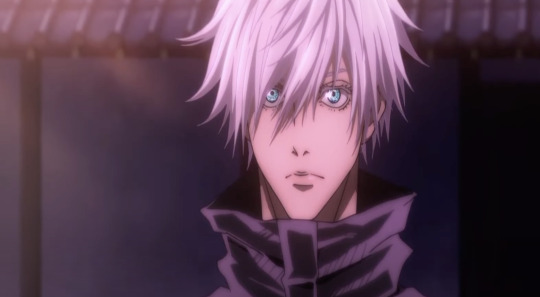
when geto is dying, gojo drops the literal and figurative mask. he's almost unrecognizable; he's not laughing, he's not smiling, and he's not wearing the blindfold, because he doesn't need it anymore. the only person he wants to see, the only person he's ever wanted to see, is in front of him now.
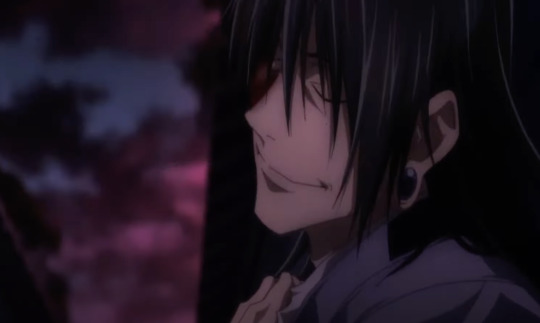
however, once again, he's not only one whose walls have come down.
geto drops the manic persona (although he retains the ideals) and he gently smiles in a way that's reminiscent of his youth. his cult leader outfit is also falling off, exposing him in more ways than one. he admits that he never had any hate for anyone at jujutsu tech, and in doing so, materializes the version of himself that lived in gojo's mind for a decade. that's why gojo doesn't bother with the blindfold; the geto in his mind and the geto in front of him are congruous and he's looking at the person he's been seeing inside his head all along.
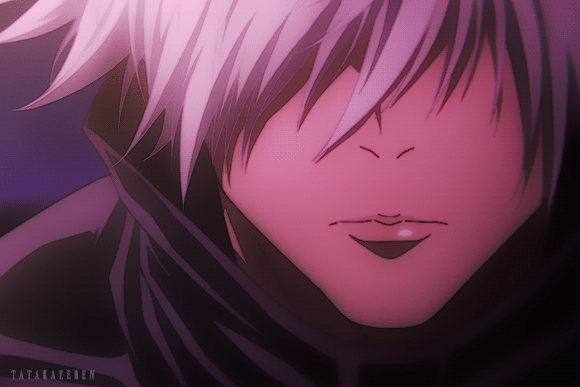
it's been established that we don't know what gojo says to geto. however, it is also absolutely key that we don't see gojo's eyes in this deeply intimate moment. his eyes, which are inextricably linked to his strength and his role. his eyes, which are the medium through which he limits his engagement with the world. his eyes, which he sealed after geto left and only brings out when he's tasked with fulfilling his role.
in this moment, he considers the question geto asked him during the breakup. "are you gojo satoru because you're the strongest? or are you the strongest because you're gojo satoru?"
and in shielding his eyes from us, gojo answers him.
"i'm gojo satoru because of you, suguru."
his eyes, as the windows to the soul and witnesses to the world, are looking at geto suguru not as the strongest but as gojo satoru, and they are meant for geto alone. yes, the eyes are the windows to the soul but they're also two-way mirror— gojo opens his eyes for geto to look into his soul because the material manifestation of his soul is dying in front of him right now. in baring his eyes, he bares his soul.
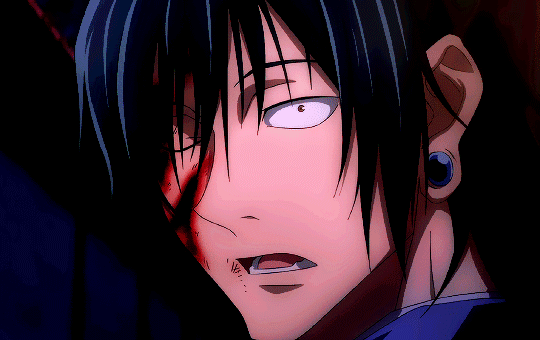
before geto dies, we see him the same way gojo does. he seems bashful, almost shy, even mirthful; all traits that are antithetical to the crazed front he put up earlier. conversely, gojo is the most solemn we've ever seen him. in this moment, we see them both for who they really are, because they literally and figuratively only reveal themselves to each other.
after they part ways in shinjuku, geto and gojo embody the same barriers through identical mechanisms: fabric and persona. these barriers function to do the same thing, which is to keep people at a distance in order to leave space for the one person noticeably absent from their lives. it's very fitting that their walls come down as they meet for the last time, because the only people who could've torn them down are the same people for whom they put them up in the first place— nobody else but each other.
#i vanished for a few weeks bc i was job hunting but i HAVE MADE MY TRIUMPHANT RETURN#my jjk meta#satosugu#satosugu meta#satosugu analysis#satosugu angst#stsg brainrot#gojo angst#geto angst#geto and gojo#stsg#stsg angst#gojo and geto#gojo satoru angst#geto suguru angst#suguru x satoru#satoru#suguru#jjk meta#jujutsu kaisen meta#jjk analysis#satoru angst#gojo brainrot#jjk#jujutsu kaisen#jujutsu kaisen angst#jujutsu kaisen analysis#geto suguru#gojo satoru#gojo
112 notes
·
View notes
Text
Right. I need to talk about the other two theme tunes Gege put down for Gojo and Geto.

Firstly you guys need to listen to Pia-no-jac Paradiso. It's like listening to Geto's brain and this person is so right in that you can definitely track his breakdown through it.
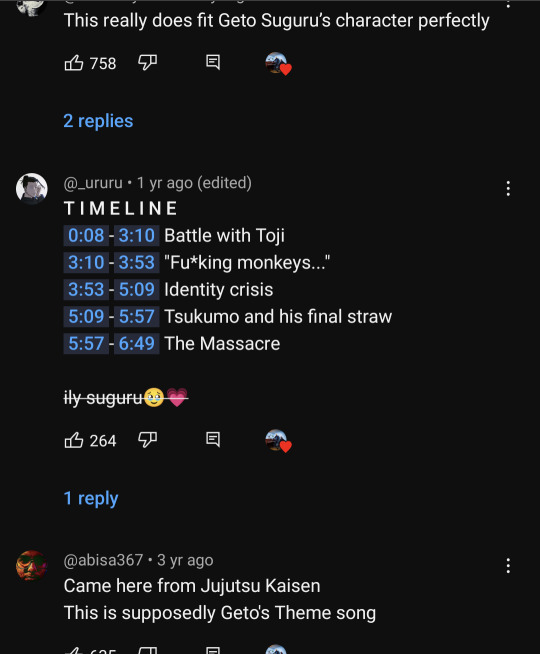
Gojo on the other hand is like reading him come to terms with his loss of Geto and his youth and strive to make the world better for his students. It's emotional and beautiful.

Just urghhhh it makes so much sense Gege is a fan of tragic BLs and used it to inspire this because my GOD.
"In a corner of a room filled with the afternoon sun
Lies a crumpled diary
When it fades to an orange and you become lonely
The last white page
Rip it out and fold into an airplane
Let it fly the great skies as we promise to meet again"
This is exactly it, Gojo mourning the loss of youth, the final act of killing Geto and that part of him and wishing he will see him again one day.

58 notes
·
View notes
Text
Satoru’s eyes literally any other time in the anime:


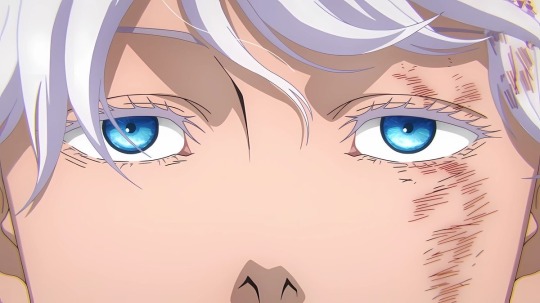
bright, shiny, controlled
Satoru’s eyes the moment Suguru was leaving:

dark, dull, panicked
#i had never ever seen his eyes like that before#that was literally the one time they looked so…stormy?#good god#satosugu#satosugu meta#jjk meta#jujutsu kaisen#jjk#gojo satoru#satoru gojo#stsg
18K notes
·
View notes
Text
Is someone gonna talk about the use of signage in yesterday's episode? Do I have to be the one to talk about the use of signage in yesterday's episode?
I know we all saw the billboard beside Choso displaying the abilities of his technique in tandem with the narrator, but there were so many more great uses of the signs in the background to convey information.
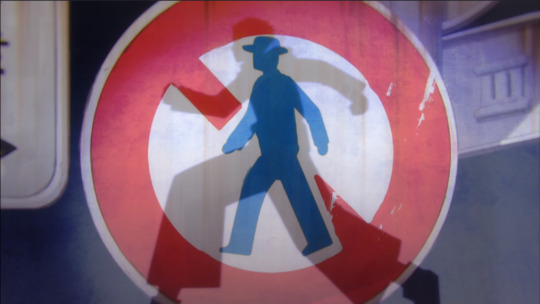
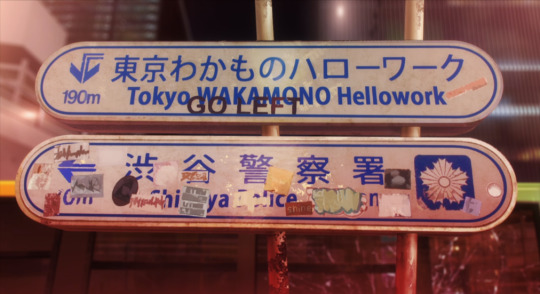
The first sign (and also one of the first shots) that we see in the episode is a Pedestrian Do Not Cross sign overlaid by the sound of Yuuji running, followed by Yuuji's shadow itself taking up the position of the pedestrian on the sign. You can read this as the sign telling Yuuji not to proceed to where he's going or as an indication of how the upcoming fight will end for the viewer.
The next sign that we get is one telling us to Go Left, which doesn't really seem important, but I promise you, it is. We'll see a lot of arrows pointing left throughout the episode and every single one of them is pointing away from danger. Go Left to avoid danger, essentially.
These two signs are arguably the most important in the episode, but they aren't the coolest use of visual symbolism that we got, so lets keep going.

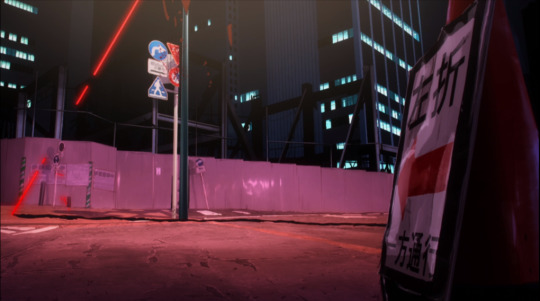
The third sign that we see focused on in the episode is a No Running sign that Yuuji passes that says "Do Not Rush. It Is Dangerous." Yuuji, of course, runs past it on his way toward the escalators that lead (for him) to Gojo and (for the viewer) to Choso.
Once he does get to the bottom of the escalators, Yuuji is attacked by Choso immediately and Choso's opening move (Convergence), once Yuuji moves his arms up and away from his face, slices up through the subway cieling and the road above to cut the Pedestrian Do Not Cross sign that we saw at the beginning of the episode in half.
We also get out first big Left Arrow, placed immediately in the foreground of the shot and pointing toward the aforementioned sign that's been cut in half (this will be important later), but in a another view, it also points away from station itself. Again, go left to avoid danger.
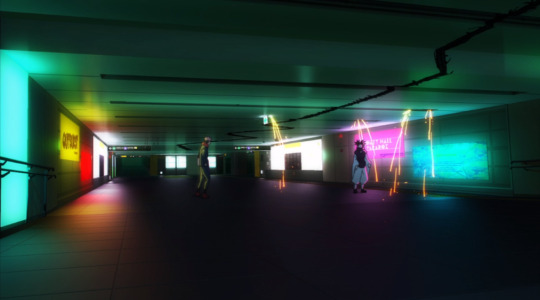

Our next Left Arrow is on the ceiling between Yuuji, indicating that he should go away from Choso. Interestingly enough, it also points toward the bathrooms that Yuuji will go into later once his fight with Choso in the hallway becomes too dangerous.
That same arrow falls to the floor between them once Choso gets mad after Yuuji tells him about Eso and Kechizu crying, this time pointing directly away from Choso.
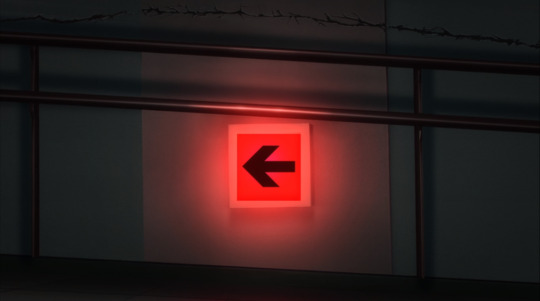
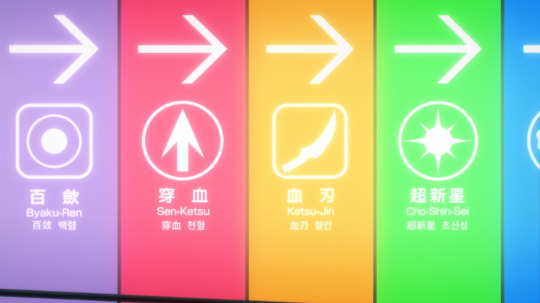
Another Left Arrow, this time in a more urgent red. We see this once Yuuji realizes that he's in serious danger, that he'll loose if he continues to fight Choso in the hallway. It's also pointing away from the bathrooms and toward the escalators from Yuuji's point of view beside the bathrooms, indicating that he needs to leave the area entirely.
The previous arrow pointing toward the bathrooms as a safe option has been destroyed and Yuuji has taken some serious damage by the time he moves toward them. The bathrooms are no longer safe. Yuuji needs to leave.
This is followed up by the only Right Arrows that we see focused on in the epsiode, but unlike the Left Arrows, they aren't used to convey how to get away from danger, but rather what is dangerous. Not only do these arrows all point toward Choso outside of the shot, they also have each of his techniques displayed below them.
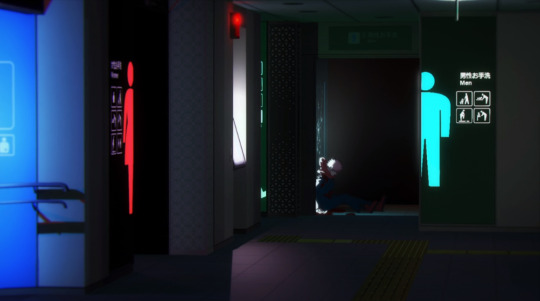
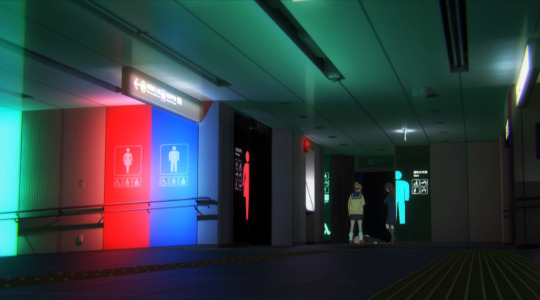
Once the bathroom fight is over and Yuuji is on death's door, we get a zoomed out shot of his body framed by (two) people cut in half. This sign is shown right before Sukuna makes his only appearance in the episode, where we hear the sound of electricity flickering.
We heard this exact sound earlier from the Left Arrow telling Yuuji to get away from Choso at the beginning of the fight, but I like to interpret it as an audio indicator of Yuuji's life and/or control of Sukuna flickering in and out, becoming weaker.
Side Note: In the previous shot of Yuuji that we get before this one, we see a blade of light cutting Yuuji in half, the same way Convergence cut the Pedestrian Do Not Cross sign in half earlier in the episode. This will come into play later in the post, but keep it in mind.
The next time we see these bisected bathroom signs is when Mimiko and Nanako approach Yuuji to awaken Sukuna. Two people framing Yuuji/Sukuna that have been cut, while those same signs are whole in the hallway to the left. Go left to avoid danger applies to the girls here as well.
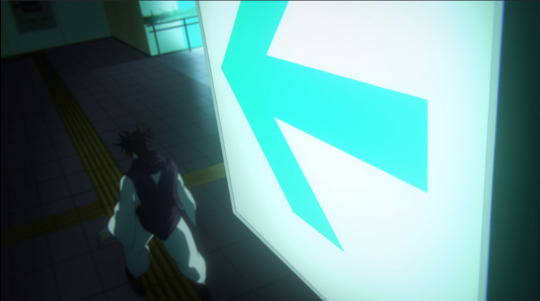
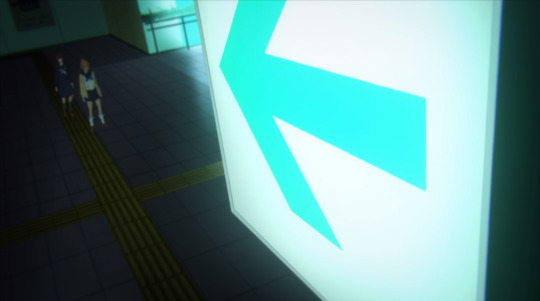
Our next important set of signs are actually the same sign, a large green arrow in the foreground that points away from where Yuuji's body is. While Choso stumbles away from it (away from Yuuji/Sukuna) the girls walk toward it.
This is also the first Left Arrow that we see point toward Choso, unlike the one pointing away from him at the beginning of his and Yuuji's fight. Choso, at this moment and onward, is no longer a source of danger to Yuuji or to us, the viewer.
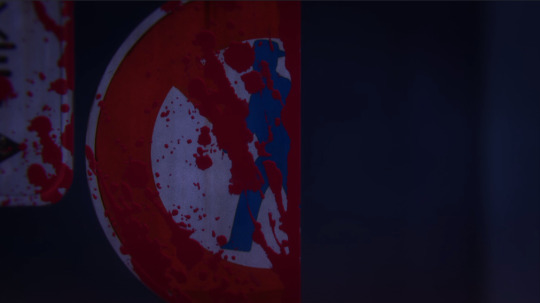
And finally, the final shot of the entire episode, our old friend, the Pedestrian Do Not Cross sign. Yuuji has lost to Choso, the girls have found him to awaken Sukuna, and we get a focus shot of the Pedestrian that previously represented Yuuji cut in half and covered in blood.
I mentioned earlier that we get another shot of Yuuji cut in half by a ray of light in the bathroom.
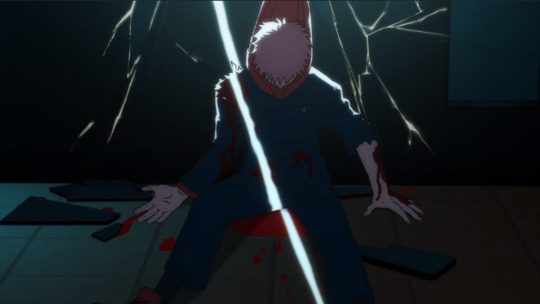
Here is that shot, and the way that I interpret it is as a reminder that Yuuji shares his body. Yuuji's control of his body has been cut off in the same way that the Pedestrian representing Yuuji has had part of it cut away. What's left is the part that Yuuji can't control, the Pedestrian covered in blood.
Additionally, repeated use of a sign showing pedestrians cut in half and bloody can also represent the civilians in Shibuya, especially now that Yuuji no longer has control of his body.
#anywho ty for reading my long post about signs and their meanings in the episode#i was originally going to make this more meme like and shorter#but after going through the epsiode several times i found it more interesting and cool than amusing#signs man. theyre everhwhere#jujutsu kaisen#jjk meta#itadori yuuji#choso#mimiko and nanako#ryomen sukuna#nicos meta
2K notes
·
View notes
Text

Are You Satisfied?
As you might have heard chapter 236 of Jujutsu Kaisen ends with the death of Gojo Satoru. The fandom is making a pretty big deal about it. As someone who predicted from the beginning that Gojo was going to lose against Sukuna, the reaction is fascinating to me. This is perhaps the most controversial chapter of Jujutsu Kaisen I've ever seen. So I've decided to throw my hat into the ring.
The central theme of Jujutsu Kaisen is death, so the death of one of the main characters isn't too surprising, but what does Gojo's death mean for the story? What does it say about his character?
As I said above I am a little bit shocked by the extreme controversy over Gojo's death. Gojo was never going to win the fight in the first place, because Jujutsu Kaisen is a story and the story would be over if he defeated Sukuna. He'd easily be able to take care of Kenjaku afterwards and the main conflcit would be resolved. Would it really be an interesting story if Gojo one shotted the villains while the kids just wathced on Television?
The story is also not about Gojo, it's about the students. Gojo may think he's the protagonist of reality but he's not the protagonist of the story.
Once again, Jujutsu Kaisen is a story and stories have themes. We may grow personally attached to characters, but characters are just narrative tools to convey the themes of a story, no different from prose, dialogue, and art. Characters are a tool to be used well or used poorly, and sometimes yes that means killing them. Whether Gojo's death was naratively satisfying though isn't the purpose of this post though we're only asking what does it mean?
Finally, Jujutsu Kaisen is not only a fictional story, it's specifically a tragedy. Full disclosure, it's a manga about death.
The Protagonist of a Tragedy
So, number one shout out to me for making this post 4 months ago where I called the way Gojo would end the fight.


Excuse me while I fist pump for calling it!
The question on everyone's minds is why does one of the most powerful characters in the manga die offscreen in a pretty humiliating way, cut in half and helpless on the ground just like Kaneki. The reason Gojo didn't get a more heroic (or cooler) death is because we're not reading My Hero Academia, this is not a story about heroes or even a typical Shonen manga it is a tragedy.
In poetics Aristotle defines tragedy as:
"an imitation of an action that is serious, complete, and of a certain magnitude; in language embellished with each kind of artistic ornament, the several kinds being found in separate parts of the play; in the form of action, not of narrative; through pity and fear effecting the proper purgation of these emotions" (51).
To paraphrase a tragedy is about human action, actions characters make in a tragedy often have dire consequences. One of the most common consequences if the reversal of a hero's fortune, a hero of a tragedy usually starts out on top and ends up on the bottom because of the bad choices they make. If in normal shonen manga characters overcome their flaws through effort and persistence, in Jujutsu Kaisen we see characters more often than not lose to their flaws.
The reason I posted that Kaneki panel specifically is because it was a brilliant moment of narrative punishment for Kaneki's central character flaw. Kaneki the hero's main flaw is that he always fights alone, and he constantly makes that same choice over and over again to fight alone. One of the characters helpfully explains it as well.

Stories are primarily about change. If a character doesn't change they're not serving the plot, unless that specifically is the point. People have pointed out how abrupt it is for Gojo to get sealed in Shibuya, get let out, and then immediately die afterwards but that's kind of the point. Gojo made more or less the exact same choice (he asked for Utahime's help for a buff but otherwise fought the entire battle himself). The definition of insanity and what not, why would doing the same thing over and over again net him a different result?

Not only did Gojo choose to fight alone, but as I've been hammering on and on about in previous meta the entire fight Gojo cared more about fighting a strong opponent then he did saving Megumi, the child he was responsible for.
Jujutsu Kaisen is not a typical shonen manga where everything is resolved by beating a strong villain in a fight. That's specifically why I used the Tokyo Ghoul reference, because the reason Kaneki is defeated offscreen like that is because he thought the world worked like a shonen manga. He has a fantasy sequence where he's fighting Juzo in a shonen battle tournament like this is Yu Yu Hakusho right before it snaps back to reality and he's limbless on the ground.
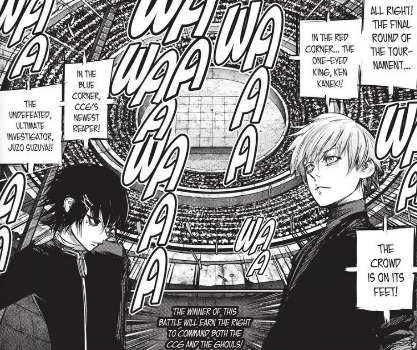
Gojo is a major character in the manga Jujutsu Kaisen, literally "Sorcery Fight" and he is the best sorcerer in the whole world. His entire identity revolves around being a sorcerer. Since he is so good and beloved at what he does, he thinks that everything is resolved by exorcising a curse or defeating a strong opponent. He has basically no identity outside of that. Which is why when he's fighting the possessed body of his student, a person he's been mentoring since childhood his priority is not to save Megumi but to beat a strong opponent. Gojo is a sorcerer, before a human being. That's who he is, that's who he always has been since day one.
I think part of the negative fan reaction comes from fans being really attached to this scene in the manga and deciding Gojo's entire character revolves around being a good mentor figure to children.

Which is just incorrect, Gojo's entire character revolves around being the strongest. On top of that though, Gojo can care about children and also care about being the strongest he can care about multiple things at once and have those things contradict each other because humans are complicated. I'd point out even in this panel where he's stating motivation he's not trying to raise these kids up into being healthy adults, he wants them to be strong Jujutsu Sorcerers. Even when he's raising kids, his intention is to turn them into Jujutsu Sorcerers because everything in Gojo's mind revolves around Jujutsu Sorcery. Gojo does not exist outside of the world of sorcerers. Gojo may be the chosen one but he'd never be able to hold down a job at Mcdonalds.
I think in general readers put more investment in the things characters say out loud, rather than their actions. You can say one thing and do another. I can say "I should never eat sweets again I'm going to improve my diet", and then go and eat ice cream five hours later. Gojo can state out loud his intention to foster children and protect their youths, but then fail to properly do that in the story. Characters are not always what they say they are, that's why they're interesting to interpret. This isn't me calling the readers stupid, just pointing out that Gojo is made up of contradictions. He wants to get rid of the old guard and replace them with something new, but Gojo IS THE OLD GUARD.
If the culling games arc has shown us one thing, it's that ancient sorcerers brought to the modern age do not care that much about human life on an individual level, they are all of them egoists. There's a reason Gojo resembles someone like Sukuna more than he does any other character in the manga. I'm not saying Gojo is exactly like Sukuna, he's far more altruistic and uses his genuinely noble ideals but at the same time Sukuna is a shadow archetype to Gojo he represents Gojo's flaws. The flaws that Gojo succumbs to in tragic fashion.
Which if you believe that Gojo genuinely does love his students, and the ideal he's fighting for is to raise up a better generation and allow them to live out their youths, then Gojo throughout the entire Sukuna fight is acting against those ideals. He cares far more about fighting Sukuna then he does saving Megumi, it's shown over and over again in the battle, Megumi is an afterthought to him. If Gojo care moredefeating the big bad and saving the world is more important than helping a child that Gojo is responsible for then Gojo is acting against his stated principles. Why should Gojo win the fight when he's fighting for all the wrong reasons?
Tragedies are like visual novels, if you make the wrong choice the novel will give you a red flag. If you ignore the red flag then you get locked into the route with the bad ending. Gojo always fights alone. Gojo only ever fights for himself, even if he's using that selfishness in support of a more noble ideal like creating a better generation of sorcerers. If Gojo consecutively makes the same changes then in a tragedy he's not going to be rewarded for it.
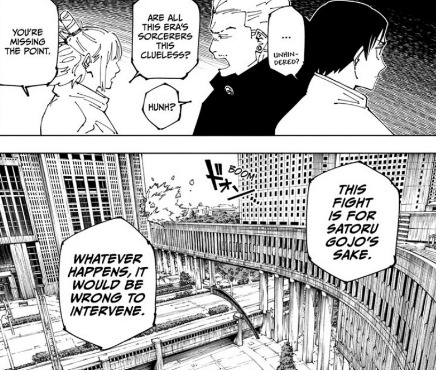
Gojo wants the old generation out and the new generation in, but Gojo resembles the old generation too much. Old sorcerers like Hajime and Sukuna respect him, Hajime argues that Gojo being able to fight for his pride is far more important than him living to the end of the battle when Yuta wanted to interfere and help him.
Gojo's death isn't a surprise curve ball that Gege is throwing us for shock value, it's a result of his choices throughout the manga. A manga about change, and the change between generations is not going to punish a character for remaining roughly the same. Of course you might find it disappointing that Gege didn't give Gojo the chance to grow and change and experience a character arc like Megumi or Yuji, but Jujutsu Kaisen is a tragedy, and the way Gojo's arc ended is consistent with what Gege wrote.

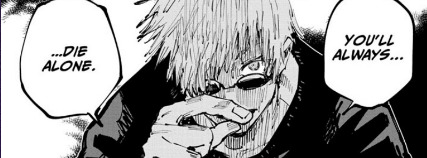
Jujutsu Kaisen is not just a tragedy though, it's a manga about death. The manga begins with Yuji's grandfather warning him not to die alone the way that he did. His grandfather's dying words are what motivate Yuji throughout the beginning of the manga as he's searching for a "proper" death.
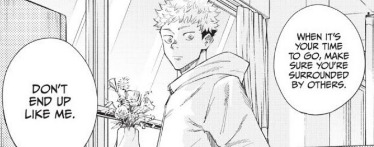
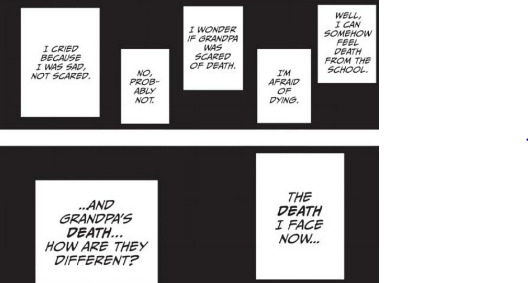

One of the major themes of Yuji's character is a contemplation of death. He accepts that death is inevitable, so he wants to save them from the gruesome deaths they'd experience if they became victims to curses and allow them to have a more satisfying death. Yuji's grandpa died an unsatisfying death because he died alone in a hospital room. Yuji even tries to make his own death a satisfying one because he believes by dying to seal away Sukuna he'll reduce the total number of casualties to curses.
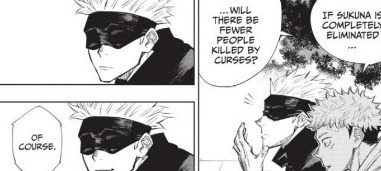
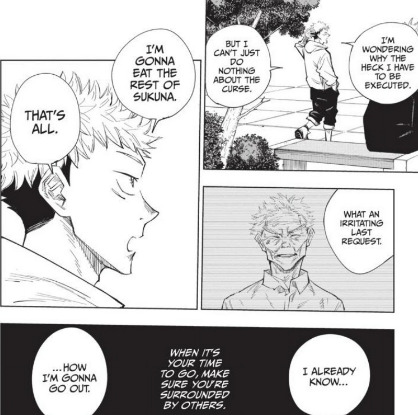
Jujutsu Kaisen keeps investigating the theme of death and what exactly would make for a satisfying death. At one point it's all but stated that death is the mirror that makes humans analyze their lives.
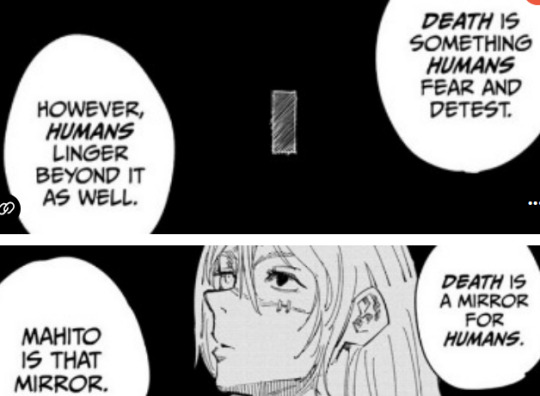
When Yuji fails to save Junpei from the "unnatural death" it calls into question whether or not his goal of saving people from unsatisfying deaths and the gruesome deaths caused by curses is even feasible. Nanami even says that Yuji might not be able to accomplish his goal and warns him away from the path.
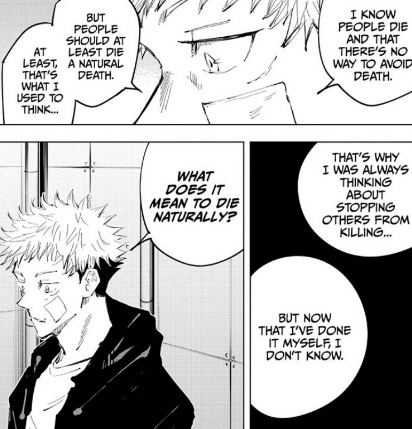
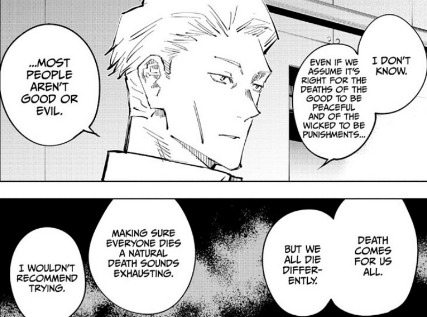
We see repeated unsatifying deaths in the manga, each time someone reflecting on their deaths that they weren't able to get what they wanted out of life. This list comes via @kaibutsushidousha by the way I'm quoting them.
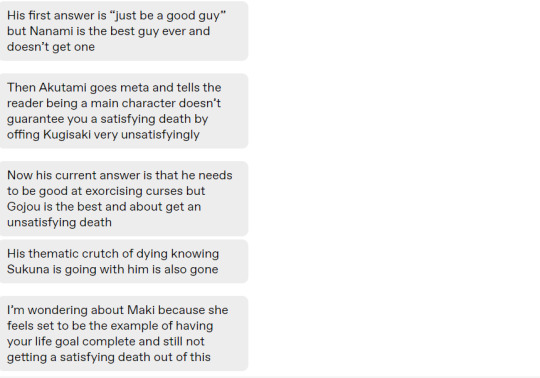
Nanami's a character who chose to work as a sorcerer because he didn't want to evade the responsibility of doing all you can to help people, he wanted to believe he's somewhere where he's needed. He never runs away from responsibility like Mei Mei does so he quite literally works himself to death, living and dying as a sorcerer. Nanami or Gojo's dying hallucination of Nanami even says as much, his death is the result of him choosing to go south and returning to be a sorcerer.
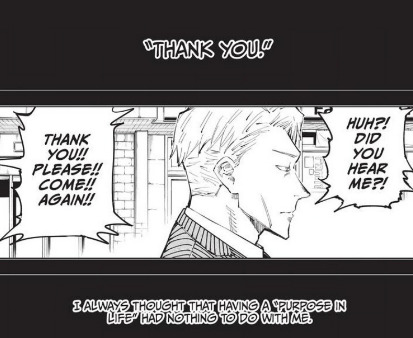
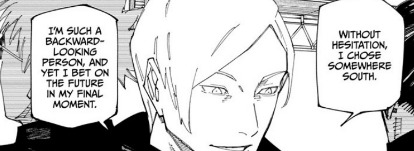
Maki chose revenge against the Zen'in over her sister, and as a result Mai is dead. Maki has all the power in the world now, her revenge complete but she's left with a sense of "now what?" She's as strong as Toji now but she failed to protect her sister, and it's the result of the choices she made. Maki's reflection isn't triumph, it's "I should have chosen to die with her."

Even Yuji himself is robbed of his narrative purpose. The manga began with Yuji saying he wants to choose how he's going to die and he'll die taking out Sukuna with him so he can reduce the number of people killed by curses in the world. Both of those things are thrown in Sukuna's face. Number one the amount of people Yuji can save by permanently killing Sukuna is now a moot point because he let Sukuna rampage in Shibuya.
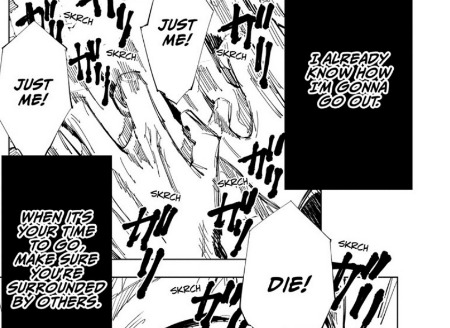
Number two, Sukuna isn't even in Yuji anymore. To build on what Comun said though, this repeated tragedy has a purpose to it and understanding requires understanding that Jujutsu Kaisen is an existentialist manga. Existentialism is basically a school of philosophy centered around the question of "Why do I exist?"
There's nothing about the invetability of death to make you question why you're alive in the first place. In the myth of Sispyhus, Albert Camus boils down all of philosophy to one question.
"There is but one truly serious philosophical problem, and that is suicide. Judging whether life is or is not worth living amounts to answering the fundamental question of philosophy. "
All of philosophy is should I shoot myself in the head or should I keep living? Everything comes after that question, which is why in Jujutsu Kaisen a lot of the characters motivations revolve around them contemplating death. Sorcerers exist in a world where they can die any moment, and as Gojo says most of them die alone. It might be the nature of sorcery itself that causes so many people to die, not only are they dying because they are trapped in an uncaring system, but the characters themselves aren't really attempting to live outside of it. They live and die as sorcerers, replaceable cogs in the machine.
All of these unsatisfying deaths may just be the result of all these characters making one choice, to live as sorcerers rather than people. Because to exist means to live in the world.
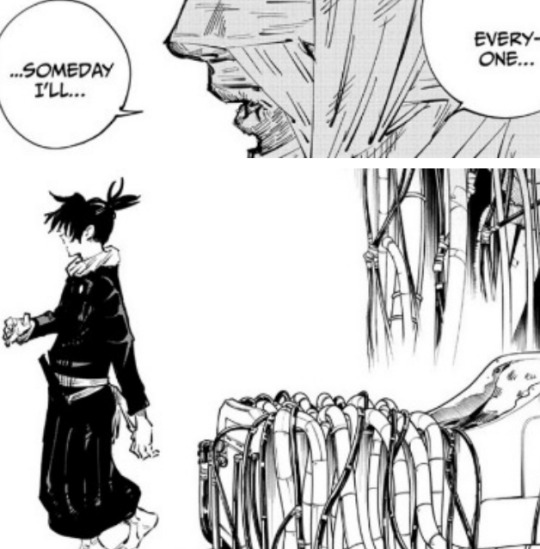

Even in Mechamaru's case, his goal is deeply existentialist by what I defined, all he wants to do is live in the world with everyone else rather than be stuck in his hospital room but his actions contradict that goal. Instead of letting his friends come and visit he's obsessed with the idea of getting a normal body because he feels that's the only way he can exist with everyone else, he makes a deal with the devil, he lies and goes behind their backs. He wasn't living with everyone else in the world and he could have chosen to, he chose wrong and his death is the result of that choice.

Jujutsu Sorcerers aren't living in the world. They're living in a little snowglobe far removed from the world with its own rules, most of them regressive and disconnected from the rest of society. If you define existentialism as just "living in the world' then a lot of these characters aren't, because they only exist in the world of sorcery.
INVISIBLE BUFFY: What are you talking ab-
SPIKE: The only reason you're here, is that you're not here. (drinking) INVISIBLE BUFFY: Right. Of course, as usual there's something wrong with Buffy. She came back all wrong. (moving around on the bed) You know, I didn't ask for this to happen to me.
SPIKE: Not too put off by it though, are you? (drinking) INVISIBLE BUFFY: No! Maybe because for the first time since ... I'm free. She tosses the sheet aside. Spike looks around, trying to figure out where she's going.
INVISIBLE BUFFY: Free of rules and reports ... free of this life.
SPIKE: Free of life? Got another name for that. Dead.
Not living in the world with everyone else is the same as being dead.
A lot of these characters either make the choice to act alone, or be a jujutsu sorcerer rather than a person and because of that they die as sorcerers, b/c sorcerers die that's what they do. Mai didn't want to keep living as a hindrance to Maki so she kills herself. Maki didn't want to be anything other than a sorcerer, so her little sister dies and she's not a big sister anymore. Nanami chose to leave his job behind and become a sorcerer again, he dies as one.
Of course I don't think the manga is punishing characters for being too egotistical, but rather too unbalanced. If anything Mai is too selfless and that is why she died, she didn't want to live for herself and chooses self sacrifice for her sister. An unbalance between selfishness or selflessness results in an underdeveloped ego. Jujutsu Kaisen doesn't punish individualism per se, moreso if you're not a fully developed individual you won't last long. Because it's also a manga about growing up in the world, and a person who doesn't have a healthy, mature, well-balanced sense of self is not a grown up.
This twitter user det_critics points out that Gojo (and also Yuki + Yuji's) failures in the manga can be attributed to the fact they don't have real senses of self.
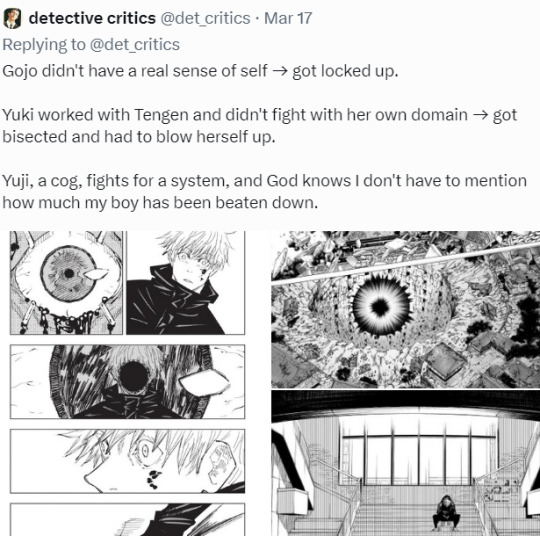
Gojo has an identity crisis as outlined by Geto, "are you Satoru Gojo because you're the strongest, or are you the strongest because you're Satoru Gojo?"
It's a challenge for him to find some reason to live outside of being the strongest, and in tragic fashion Gojo just doesn't find it in time. Gojo lived for fighting others, and proving to himself that he's the strongest, and that's how he dies.
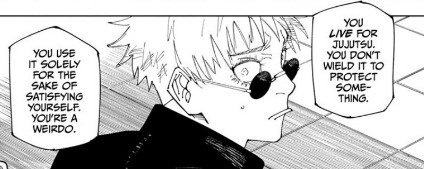
There's something I like to say about narrative punishment in stories. There are two ways to punish a character, you either don't give them what they want, or you give them exactly what they want. This is the latter, Gojo wanted to find someone stronger than him because deep down he believed that nobody could understand him unless they were on his level. He wanted to be surpassed, and that's why he focused on creating stronger young sorcerers, but he never shook himself of the belief that only someone as strong or even stronger than he was could ever be emotionally attached to him so he made a deliberate choice to draw a line between himself and others.
Gojo's essentially gotten what he wanted from that choice in the worst way possible. The student he picked to succeed him Megumi, has his body stolen and kills him. Gojo is surpassed, but it's not by one of his own students it's by an enemy that's not only trying to kill Gojo but is going to massacre his students afterwards.
Gojo's spent his entire life believing that because he's more powerful that makes him inherently different and above others, and being lonely because he himself believed he couldn't relate to ordinary people and he dies like an ordinary person, an unsatisfying death where he wasn't able to bring out Sukuna's best, where he gets unceremoniously cut in half offscreen but yay he's no longer the strongest. He's gotten exactly what he wanted. Megumi is still not saved, Sukuna's probably going to kill more people because Gojo failed to stop him here, but hey at least he stopped to compliment Gojo.
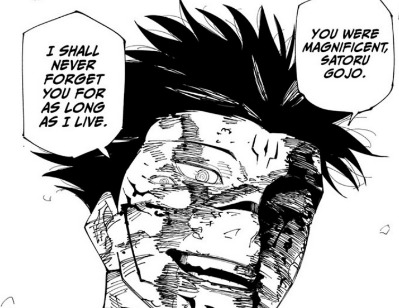
It's empty, but it's empty because of the choices Gojo made in life to just not bother connecting to people or develop any kind of identity besides being a sorcerer. Gojo lives and dies as a sorcerer, and his dying dream is returning to a teenager being surrounded by everyone he was with during his school days, because that's the happiest time in his life. Ironically he was happier before he became the strongest, because that was the only time in his life that he allowed himself to connect to people.
However in the eyes of others, he is someone who has it all. That's why he is always alone. There was no one who could hold the same sentiments and mutually understand him. Geto was the only one who could understand what he was trying to say, and the only one who could communicate well with him.
It's no coincidence Gojo and Geto die exactly a year apart on the same day, if anything I'd say the reasons they die are similiar to at least thematically. They both die because they don't want to live in the world. Geto thinks the world is too corrupt and GOjo doesn't want to be anything other than a sorcerer, both of them fail to adapt.
「 'It's just. . .'
It's just that it was what Geto had to do.
[...] To someone like him, the reality that the world of sorcerers presented to him was just too cruel.
'. . .that in a world like this, I couldn't truly be happy from the bottom of my heart.'」
They can't be happy in a world like this from the bottom of their hearts, so narratively they both die. The things they chose to live for at the end of their life they fail to accomplish, Gojo is no longer the stronget, Geto fails to wipe out mankind or make major changes to the world and they die as normal people unsatisfied because they weren't trying to live in the world and make connections to others. They die almost karmically a year apart because their main connection for both of them, the thing which made them feel connected to the world and other people was each other.
Which is why this panel breaks my heart and is so narratively satisfying because of how unsatisfying it is...
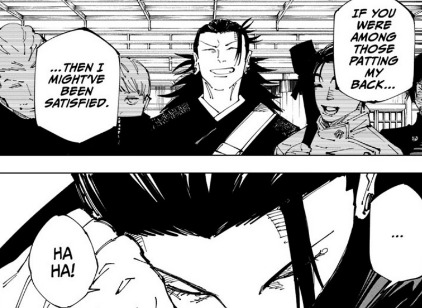
"If you were among those patting my back... then I might've been satisfied."
Gojo reflects that he's not satisfied dying against Sukuna, not because he failed to give him a good enough challenge but because Geto wasn't there to pat him on the back. The one thing that would have satisfied him he couldn't have, because he didn't live to connect to people he lived to be the strongest and he died alone as the strongest. There's just something deeply upsetting about Gojo's dying dream fantasy just him being there talking with all of his dead friends who he never appreciated or connected to properly when he was alive. Knowing that if something had just gone a little differently, that even if he had to die no matter what he could have died happier if Geto was among the people saying goodbye to him because that connection with Geto is what gave his life meaning.
Dazai Osamu: "A life with someone you can say good-bye to is a good life, especially when it hurts so much to say it to them. Am I wrong?"
-Bungou Stray Dogs Beast
#gojo satoru#jjk spoilers#jjk meta#jujutsu kaisen 236 spoilers#jjk 236#jujutsu kaisen 236#jjk 236 spoilers#jujutsu kaisen#jujustu kaisen meta#jujutsu kaisen theory#jujutsu kaisen manga#satoru gojo#geto suguru#suguru geto#satosugu
1K notes
·
View notes
Text
i’ve always liked how judgeman is depicted with its eyes stitched instead of the typical blindfold you see on lady justice. there’s something more severe, more committed, about it instead of a removable blindfold—as if justice is an integral part of its physical being as a shikigami, and not an extension, not something you can “take off.”


(other than the fact that stitches just fit its uncanny appearance more, and because stitches are very symbolic in jjk, it would’ve also been redundant to give judgeman a blindfold, considering gojo himself is easily identifiable by his blindfold).
hiruguma himself has said it:

equality before the law—that is the principle he was referring to here. no matter what, no matter who. then,
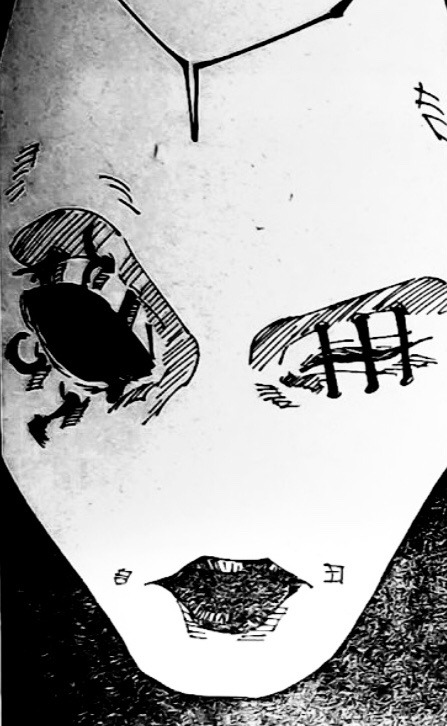
how horrific must the revelation of sukuna’s crimes had been for judgeman to force a stitched-shut eye open. a guilt so heavy, it turned the scales upside down and left no room for impartiality.
i’ve always found it interesting that sukuna used to be human in his past life. a powerful sorcerer, but human nonetheless. and though he is a curse now, what differentiates him and the living sorcerers we see today? in fact, what differentiates curses and sorcerers? what happened to sukuna for him to turn out the way he did? what was his critical point, when he became “unsaveable,” and where was his point of no return?
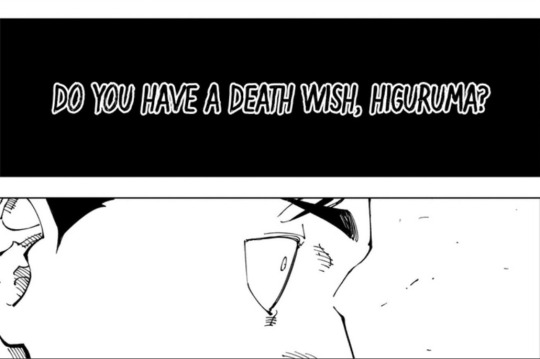
(also, when—if—higuruma dies, will he go with his eyes open? heart on his sleeve, raw, not yet atrophied?)
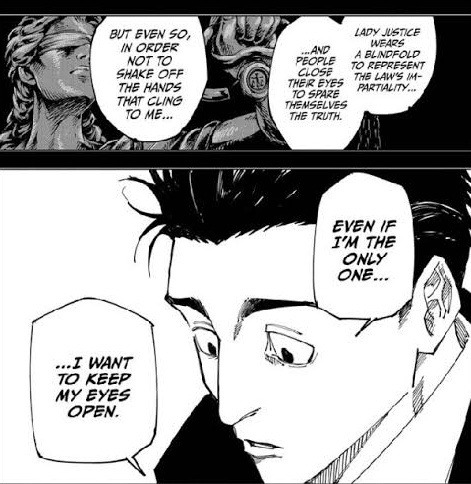
678 notes
·
View notes
Text
If Geto and Gojo were so close, why didn't Geto try to convince Gojo to defect with him?
Because Geto knew that Gojo’s support would guarantee his success, but that success would come at the cost of hurting Gojo.
I believe that Geto cared more about protecting Gojo than he cared about building a better world.
..
Let me explain…
First, let’s talk about why it would’ve made sense for Geto to ask Gojo to join him:
(1) Gojo would’ve been Geto’s most important / most powerful ally
By the time of Geto’s defection, Gojo is already the strongest sorcerer in existence. He and Geto are two of only three special grade sorcerers. Having them both on the same side is essentially an automatic win.
(2) Gojo should’ve been (relatively) easy to persuade
Gojo had already told Geto that he didn't like having to save the weak and didn't care about the moral justifications for it…
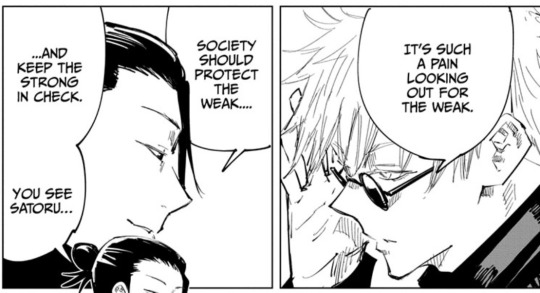
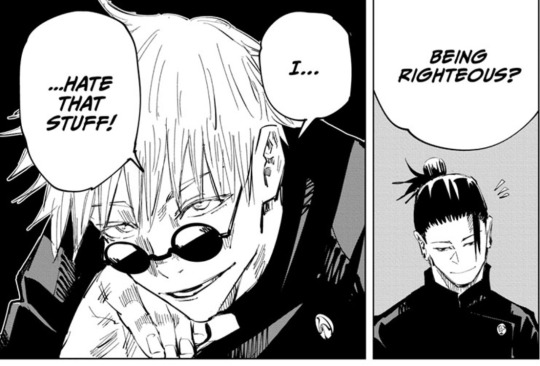
…Geto has also seen that Gojo doesn’t always value / protect human life. He was ready to massacre the Time Vessel Association without reason, but ultimately he didn't, because he deferred to Geto's judgement…
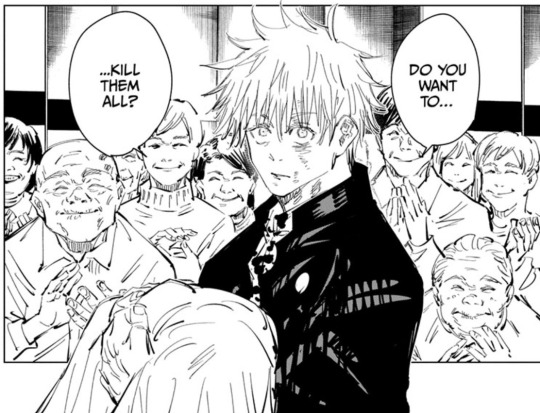
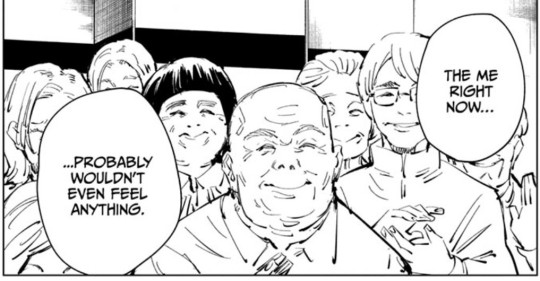
…and, most importantly, they are best friends on a DEEP, unparalleled level. Geto is Gojo’s “one and only” best friend.
If Geto was truly dedicated to changing the world order, Gojo should’ve been the first and most important person that he tried to recruit to his insurgency / cult / mission.
BUT
Not only does Geto make zero effort to reach out to / recruit Gojo, he actively avoids him and pushes him away...
- - - - - Keep reading cut - - - - -
After he kills the 112 non-sorcerers, Geto runs into Shoko in Shinjuku. He happily approaches her and willingly answers her questions.
Look at his smiling face in their interactions:
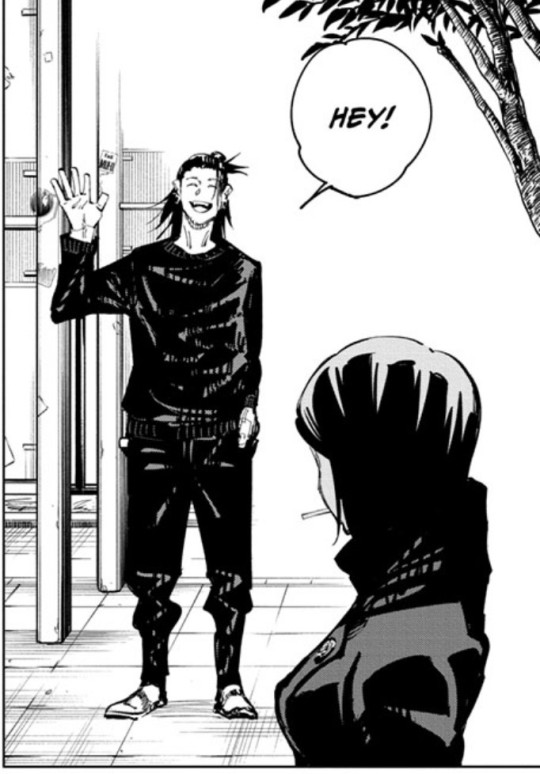

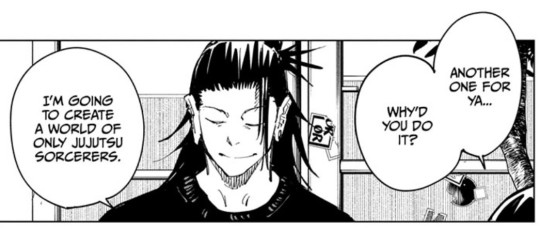
But, when Shoko calls Gojo, Geto leaves before Gojo shows up. Gojo tracks him down anyway and demands an explanation. Geto still doesn’t want to talk about it (“You already heard it.”)
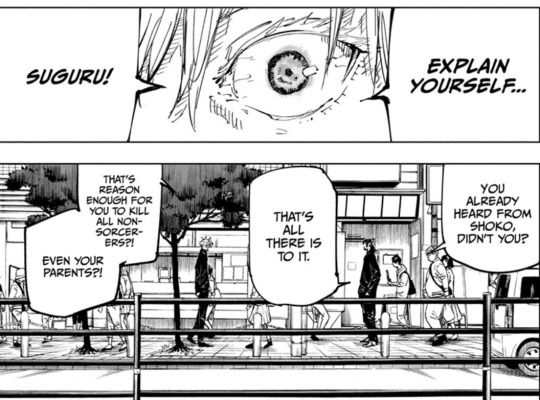
It's strange, right? Geto loves talking about his vision of a better world with everyone else.
Then, there is this confusing progression of dialog:
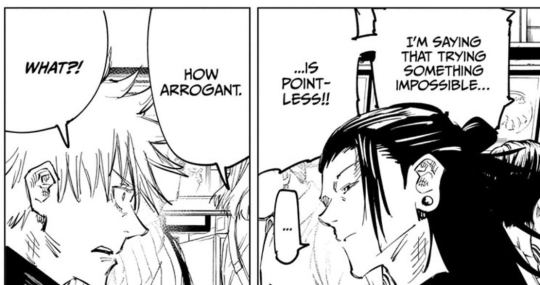
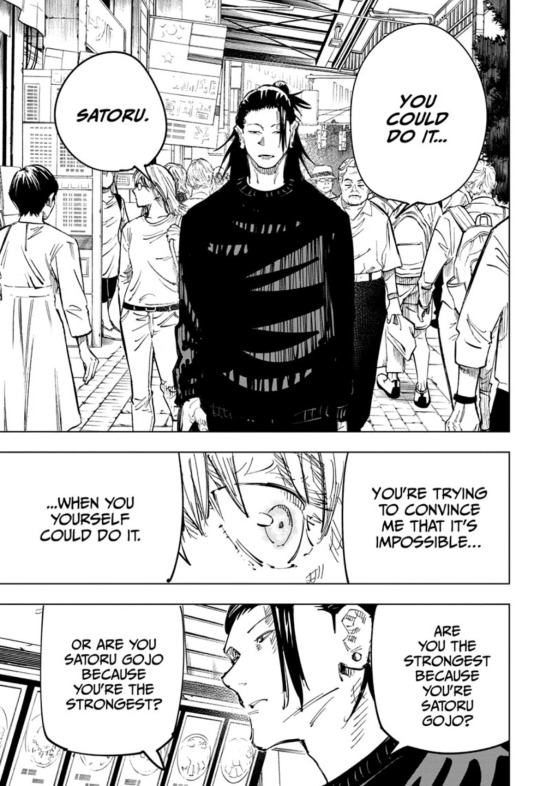
Geto is hurt/annoyed that Gojo doesn’t believe in him, so he points out that Gojo’s argument against his plan is invalid. The plan is possible (“You could do it”), therefore (according to Gojo’s own logic) it’s not “pointless.”
In a way, Geto is admitting that he knows it would make the most sense for Gojo to join him.
But before Gojo can respond, Geto pivots to saying something extremely hurtful. He's questioning who Gojo is / would be if he wasn't the strongest. Is there really anything more to him? (See more detail in my post here).
Then, in the very next panel Geto turns and starts walking away.
In summary: (1) Geto avoids Gojo, (2) Geto only argues in favor of his plan when Gojo forces/baits him, (3) Upon invalidating Gojo’s opposition to his plan, Geto immediately puts emotional distance between them, (4) Geto then puts physical distance between them.
Why is Geto trying so hard to make sure that Gojo won’t follow him?
Is he just being prideful about doing this on his own? Is he so angry at Gojo's arrogance that he'd jeopardize the success of his life's mission over it?
These arguments aren't in line with Geto's characterization / known motivations (see the end of this post, if you're interested in more on that.)
Geto's main motivation is (a twisted form of) compassion. He wants to end the suffering of sorcerers.
He is a thoughtful, contemplative person, and would've thought about the ramifications of recruiting Gojo.
What are the ramifications?
If Gojo joins the cause, Geto’s plan would succeed, but Gojo would suffer for it.
Like anyone who joins Geto's cult, Gojo would become a pariah / fugitive from Jujutsu society. He’d kill people. He’d kill other sorcerers.
But because Gojo has the singular level of strength/ability to kill non-sorcerers en masse, he would commit the vast majority (or all) of the murder / destruction. The legal, social, and mental impacts would be most severe on Gojo.
(Also, at this point, I think Geto may still question whether he’s made the right choice. It’s difficult to go from a hardline stance on protecting non-sorcerers to wanting to gen0c1de them, within the span of a year, without any lingering ethical qualms. So he may be worried about moral costs to Gojo as well.)
Let’s remember that Geto (canonically) deeply loves Gojo. Gojo is his one and only best friend. Geto worries about Gojo when he overworks himself protecting Riko. Geto is shocked when Toji kills Riko in front of him, but he only flies into a rage when he thinks Toji has killed Gojo. (Again, see my post here for more on how much Geto loves Gojo).
So, it makes sense that Geto is ready to make sacrifices to create a better world, but it’s a cost he’s willing to put on his own head. Not Gojo's.
Ultimately, Geto cares more about Gojo than he cares about achieving the mission he has dedicated his life to.
The last thing Geto says to him is this:

What he's really asking Gojo is: "Have you stopped loving me, now that I've committed myself to this dark path? Would you kill me to save them?"
If Gojo hates Geto enough that he’d kill him, then Geto never had a chance of recruiting Gojo in the first place.
Of course, Gojo can’t make himself hurt Geto. He still loves Geto too much.
Geto protected Gojo by pushing him away.
___
Addendum:
I'll also argue against two other possible explanations for Geto's behavior.
(1) Geto is jealous / prideful /wants to build his own legacy without Gojo stealing the spotlight
Geto has clear motivations for his goals and they’re not egotistical. He wants to end the suffering of sorcerers caused by non-sorcerers’ existence (e.g., Riko’s death, Mimiko & Nanako’s abuse).
Geto’s pride isn’t hurt when Gojo becomes the strongest. The only thing that bothers Geto is that they’re getting sent on separate missions.
After Gojo becomes stronger that him, Geto still has overt affection for Gojo (e.g., he asks Haibara to bring back sweets from his mission so he can share with Gojo).
Although Geto does believe in his superiority over non-sorcerers, he doesn't feel superior over other sorcerers and doesn't struggle with his 'inferiority' to Gojo.
Does Gojo’s lack of faith in Geto’s ability (calling his goal “impossible”), spur Geto to want to prove himself? Yes, probably. But Geto had already been avoiding Gojo before he said that. And I don’t believe that wanting to prove himself to Gojo would overshadow his stronger motivation to build a better world for sorcerers.
(2) He thinks Gojo actually is too moral to join him
After Geto kills the 112 non-sorcerers, Gojo is shocked and upset by what’s happened, but not once does he insult Geto or imply that Geto has done something unforgivable. In fact, he’s practically begging Geto to explain himself because he wants to be able to justify his actions. And, again, Gojo’s argument against Geto’s plan is NOT that “it’s wrong,” it’s that “it’s impossible.”
#This is what I live my life by 100%#I will not be convinced of any other truth#satosugu#jjk#jjk analysis#jujutsu kaisen#gojo x geto#gojo satoru#geto suguru#stsg#gego#goge#satosugu analysis#jjk manga#jjk canon#satosugu canon#jjk meta#satosugu meta#sugusato#my jjk thoughts
767 notes
·
View notes
Text
I still can't get over stsg's introduction as a concept. gojo was built up to be isolatingly powerful, a league of his own: childish, annoying to all those close to him, hard to stand but respectable (aka nanami and utahime), a slippery guiding mentor, unruly and untamable, a whole force of his own and solely his own (the confidence, the disobedience to elders, the reputation, the fear and awe around him)---all introduced through yuuji's non-judgemental and curious lens. I think someone pointed ages ago out how- the closer someone is to gojo, the more tired they look inside. and that's why when they actually introduce the fact gojo had an actual, real friend- a best friend- you start to think, what? what kind of person would suit and match satoru gojo? who is this? who would make gojo feel equal? and it's somehow??? this obnoxiously moral guy?? filled with a kick of anger and buckets of tormented righteousness, and a witty (later turned bitter) benevolent streak. and you watch gojo watching him, always standing by him, watch him fit into place there like he couldn't see anything else. watch the in-sync laughter, the back-and-forth banter, watch them just be teenagers admist it - someway and somehow - same childish attitude, but younger, impressionable, and its like gojo's storing all his experiences with geto away in his mind. the discussions of who to protect-? gojo lives it out. the pain of geto's fall-? gojo carries it for the rest of his life, an aching open wound. it almost hurts that gojo's childish antics aren't complimented by geto's indulgent, light-hearted admonishing anymore. something you didn't realise was missing the whole time until now??? didn't realise "after all, I'm the strongest" used to be been "after all, we're the strongest". and in getting to know geto, you puzzle through how he was gojo's 'one and only': a guy who's personality comes off a bit controlling, a bit forceful, way too philosophical, clinically considerate- and somehow this really was gojo's best friend. they clashed over all their differences all their time together and yet even that was so important to them both, and you come to know it couldn't have been anyone else. this is who helped make gojo who he is. this is who was missing from him at the start.
#rambling again sorry#physically needed to get this off my chest#its been in my head ever since i read the hidden inventory arc#jujutsu kaisen#satoru gojo#suguru geto#stsg#satosugu#jjk meta#txt#jjk#my thoughts
1K notes
·
View notes
Text
The man surrounded by the theme of love…
Geto.
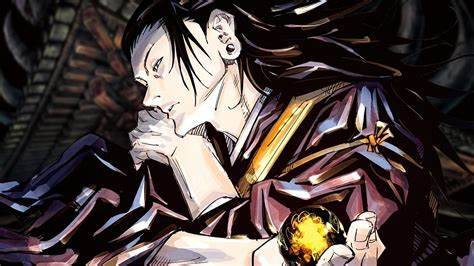
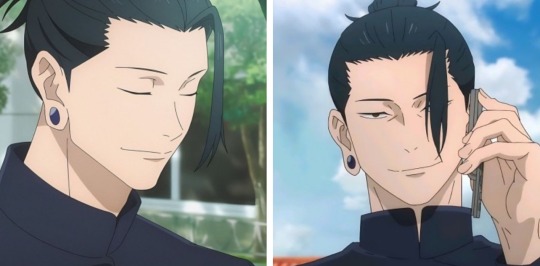
Gege has made several writing choices to depict Geto as someone who was handsome and loved - arguably more than any other character in the series. Maybe Gege loves him the most - not complaining at all.
More under the cut - just a few visuals I’ve collected to demonstrate this. I’m certainly not alone in noticing it and there may be others who show this much better, lol. Tag me in if you want to share!!
My post does end with a not-so brief analysis which you can skip if you wish.
Geto, despite being cursed at birth with the technique to absorb the ills of the world, the very skill that led him to fight alongside Gojo as part of the Strongest Duo - by design, each others’ counterpart in so many ways - a twist of fate led them onto opposite paths, leading to complete imbalance, one that drove him into madness.
If Geto in some ways represented Love, it is truly the most twisted curse of all which played a part in his death.
Geto witnessed the most love confessions in the whole series - I found (and stole) it off twitter/now X:
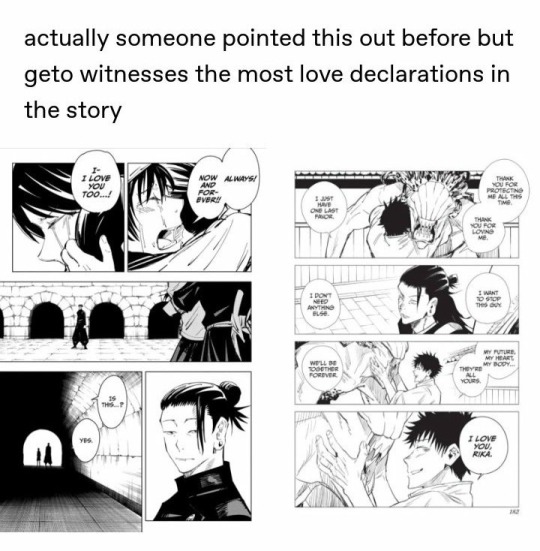
The Japanese originals seem more compelling to me:
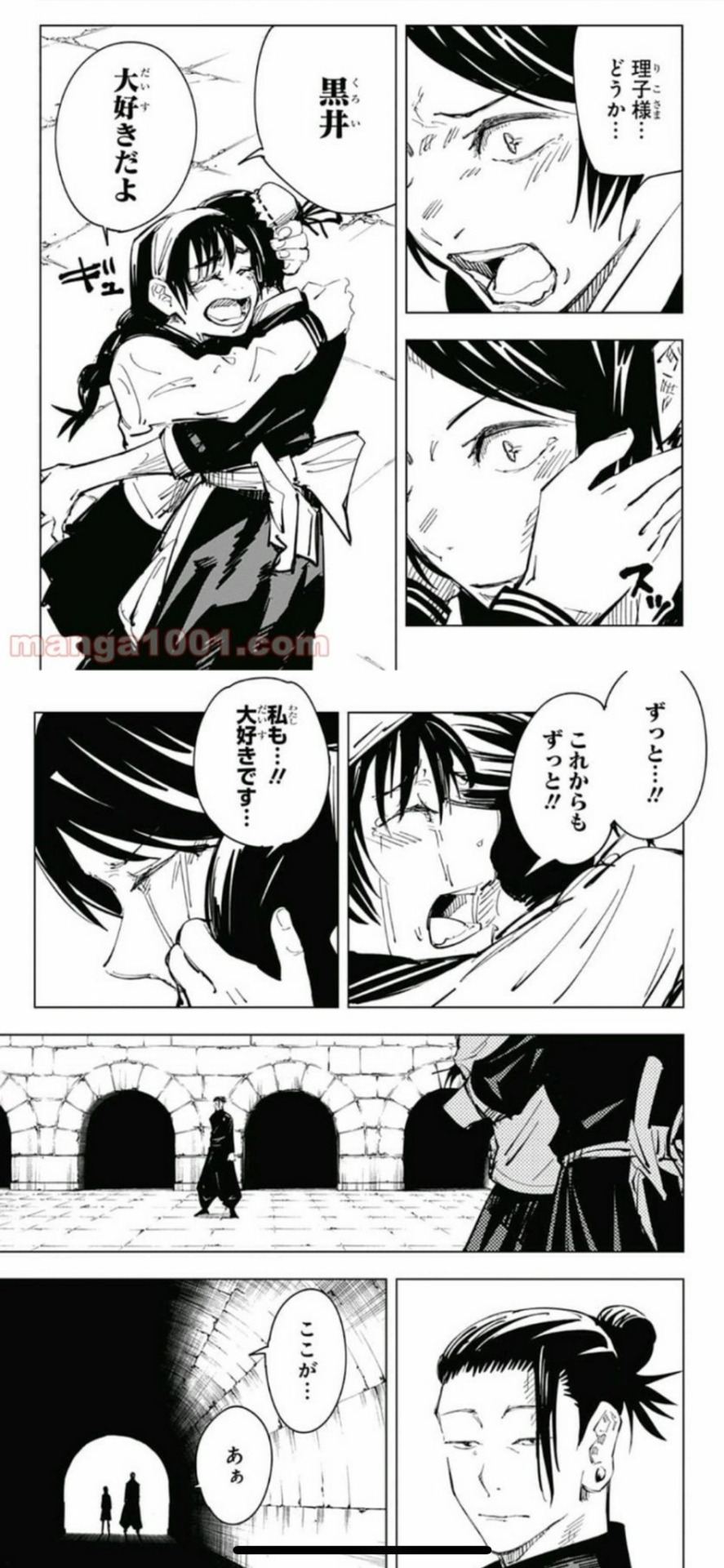
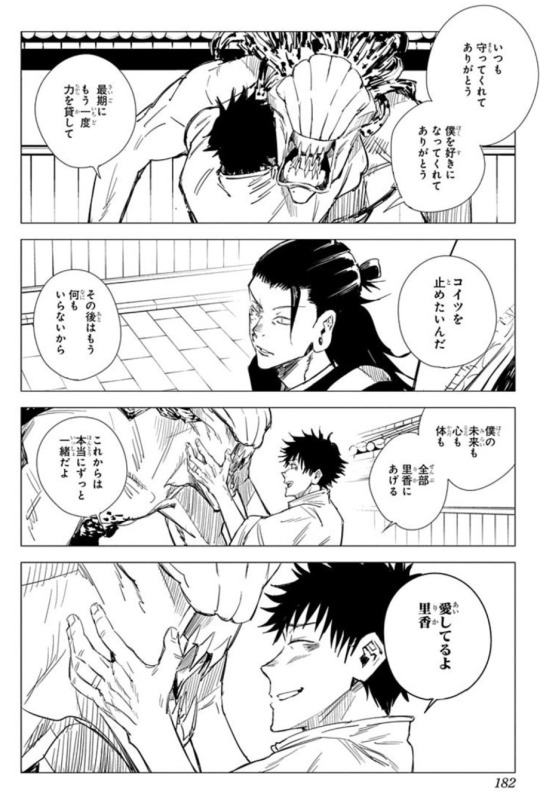
Riko says “daisuki” whereas Yuta uses a more traditional “Aishiteru” which, is quite embarrassing of a confession, and therefore almost hints at what could be Gojo’s last words to Geto, if it directly parallels Yuta & Rika’s relationship. And that expression Geto wears when he sees Riko and Kuroi struggle with separating?
That does not look like a person who cannot sympathise and empathise with people. Geto was a person who cared too much, and in search for a way to protect those he cared for, needed an outlet and something (in this case, lesser being, the humans) to blame. He descended into a mania and much like shinobu sensui from yu yu hakusho, seemed to develop some kind of mental disorder due to being unable to carry the conflicting ideals together. The dissonance the world presented to him was just too cruel, and he himself became a weapon to defend his ideals.
Before his defection, Geto was liked by his peers:
Haibara
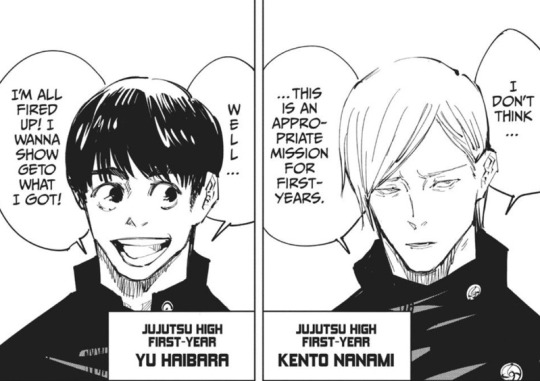
Mei Mei
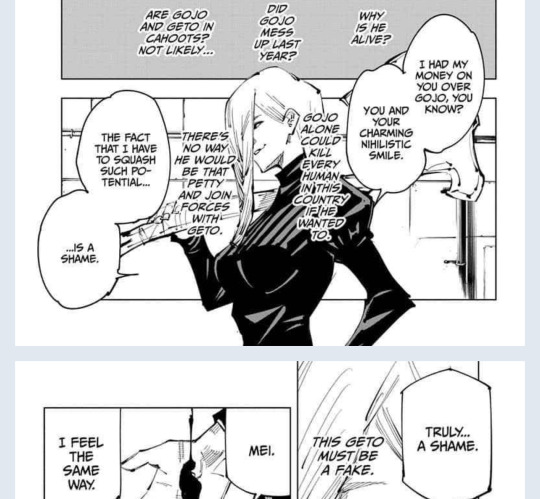
Loved by his family for and despite his ideals:
Mimiko and Nanako
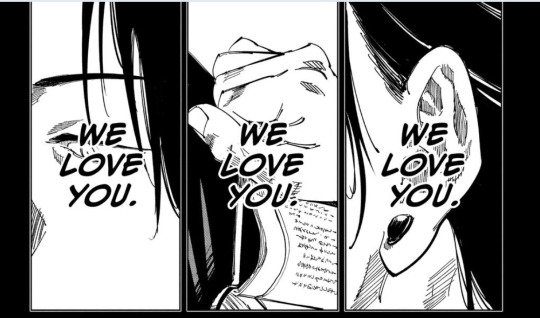
Shibuya crew liked/loved him and carried his will/beliefs even after his death, in their own ways, as family:
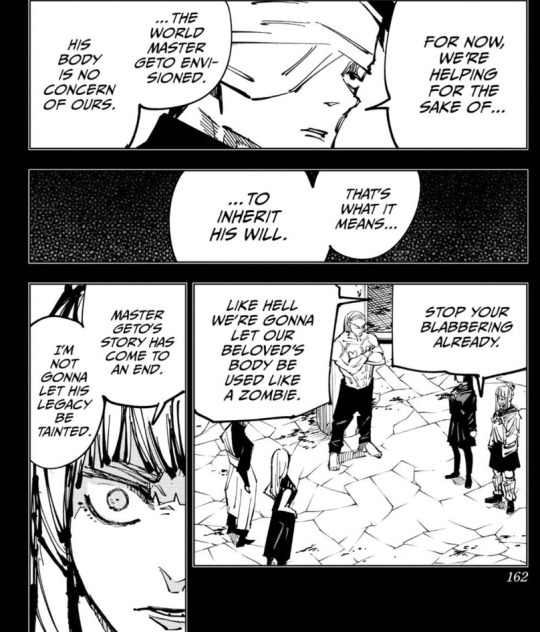
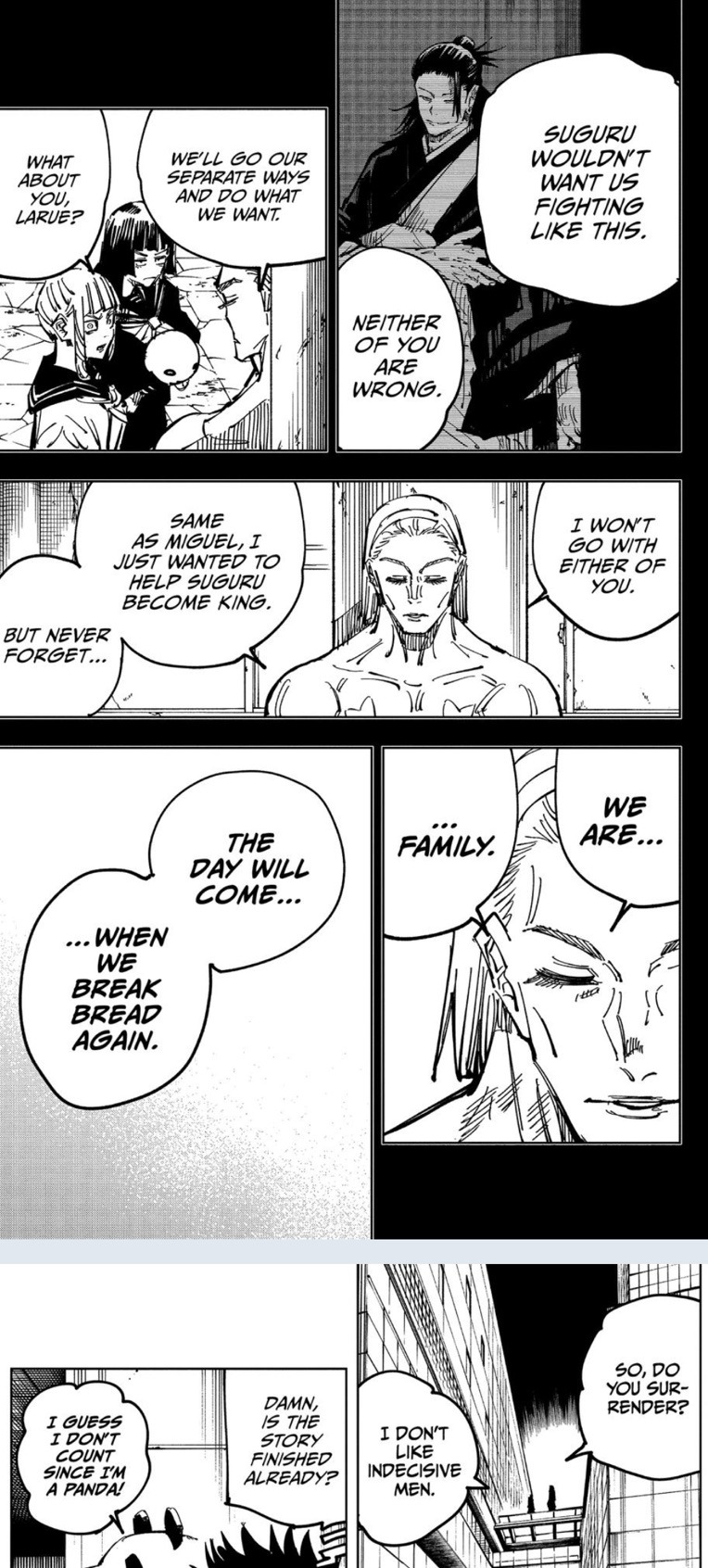
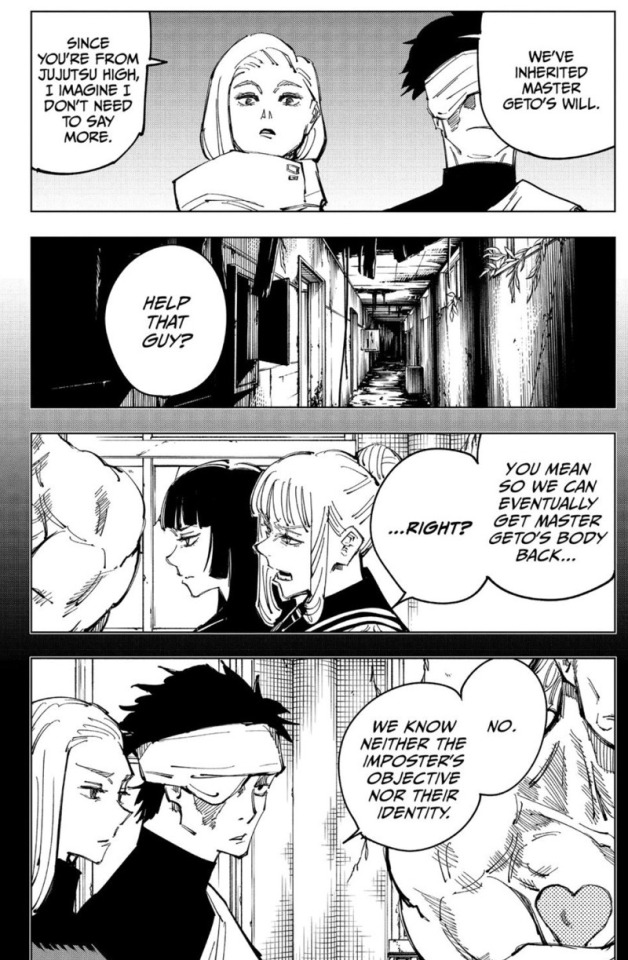
Miguel and Larue in the most recent chapter to date:
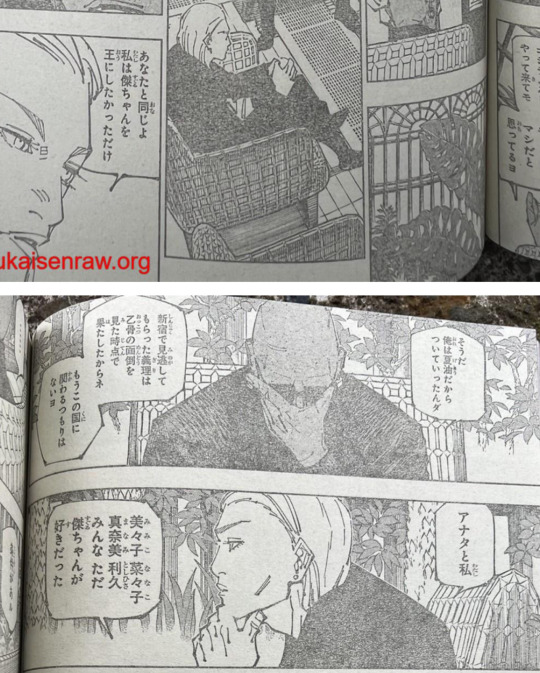
Translations (rough):
Larue: You and me alike, we just wanted Suguru-chan to be King.
Miguel: Yea, I followed just because it was Geto. After shibuya, I trained Okkotsu and I don’t want anything to do with the country anymore. (Something along these lines; a little too complicated for my rudimentary Japanese)
Larue: You , me, Mimiko, Nanako, Manami, Toshihisa, everyone just really liked/loved Suguru-chan.
Canonically, he was known to be handsome and popular:
Takaba
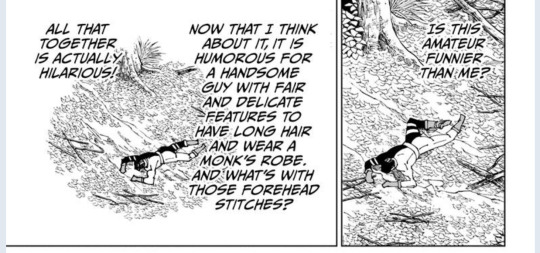
Gege’s character book:
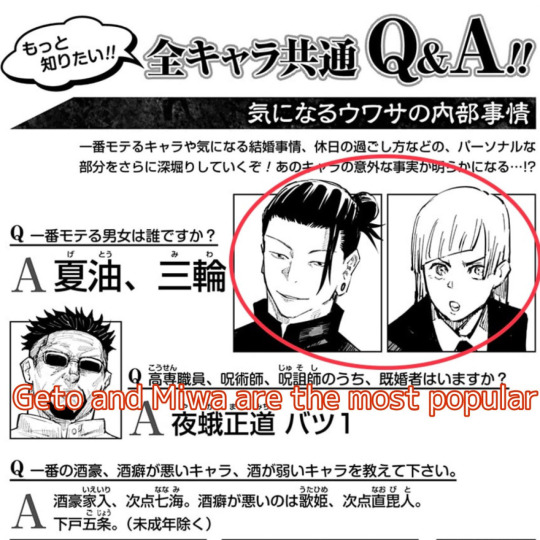
JJK popularity poll:
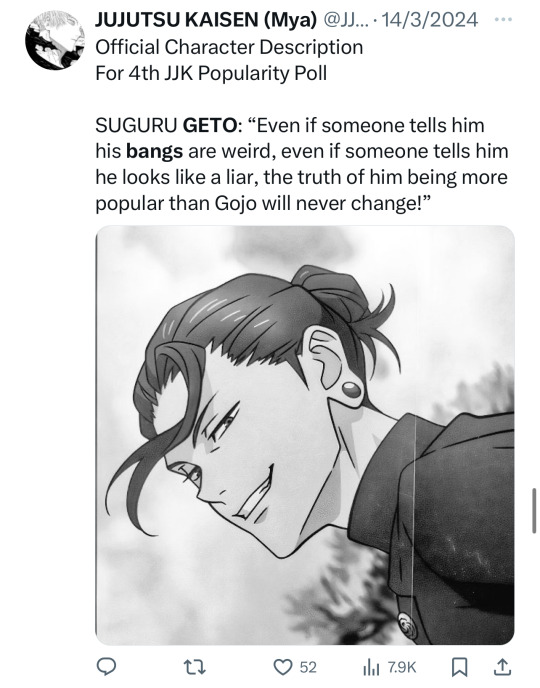
I do not have screengrabs of how Manami and Larue joined, but it was said to be due to how handsome they thought he was.
Maybe he was like Rika, who did realise how she came across in her life, and manipulated people, lol. But that’s a bit of a stretch to bring that parallel/similarity in. Geto was just quite a magnetic person, according to Gege.
And in the most roundabout way:
Gojo:
“my one and only”
“Love is the most twisted curse...” “curse me a little at the end.”

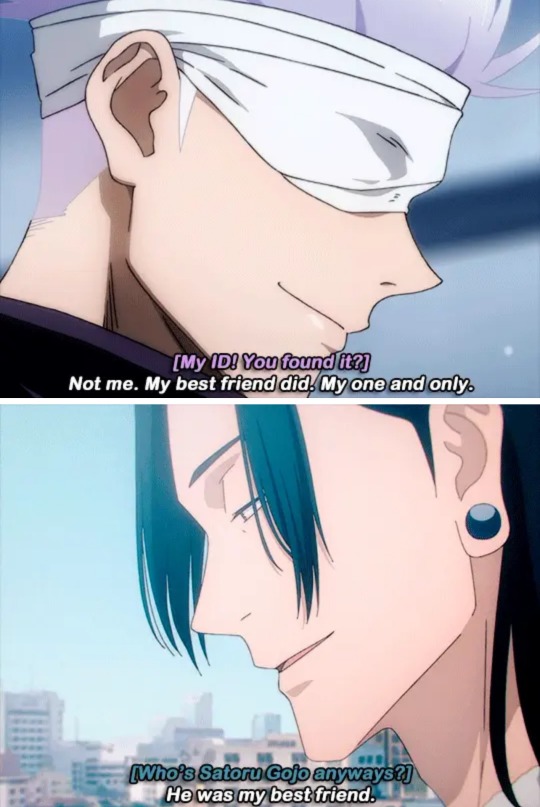
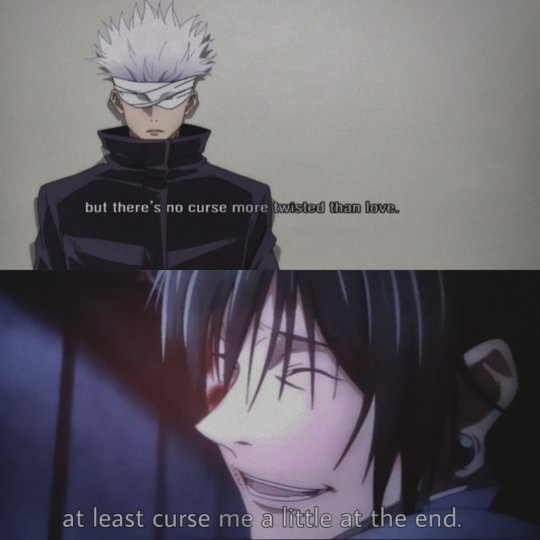
“I don’t need love to satisfy me” ... “if you were there I might’ve have been satisfied”
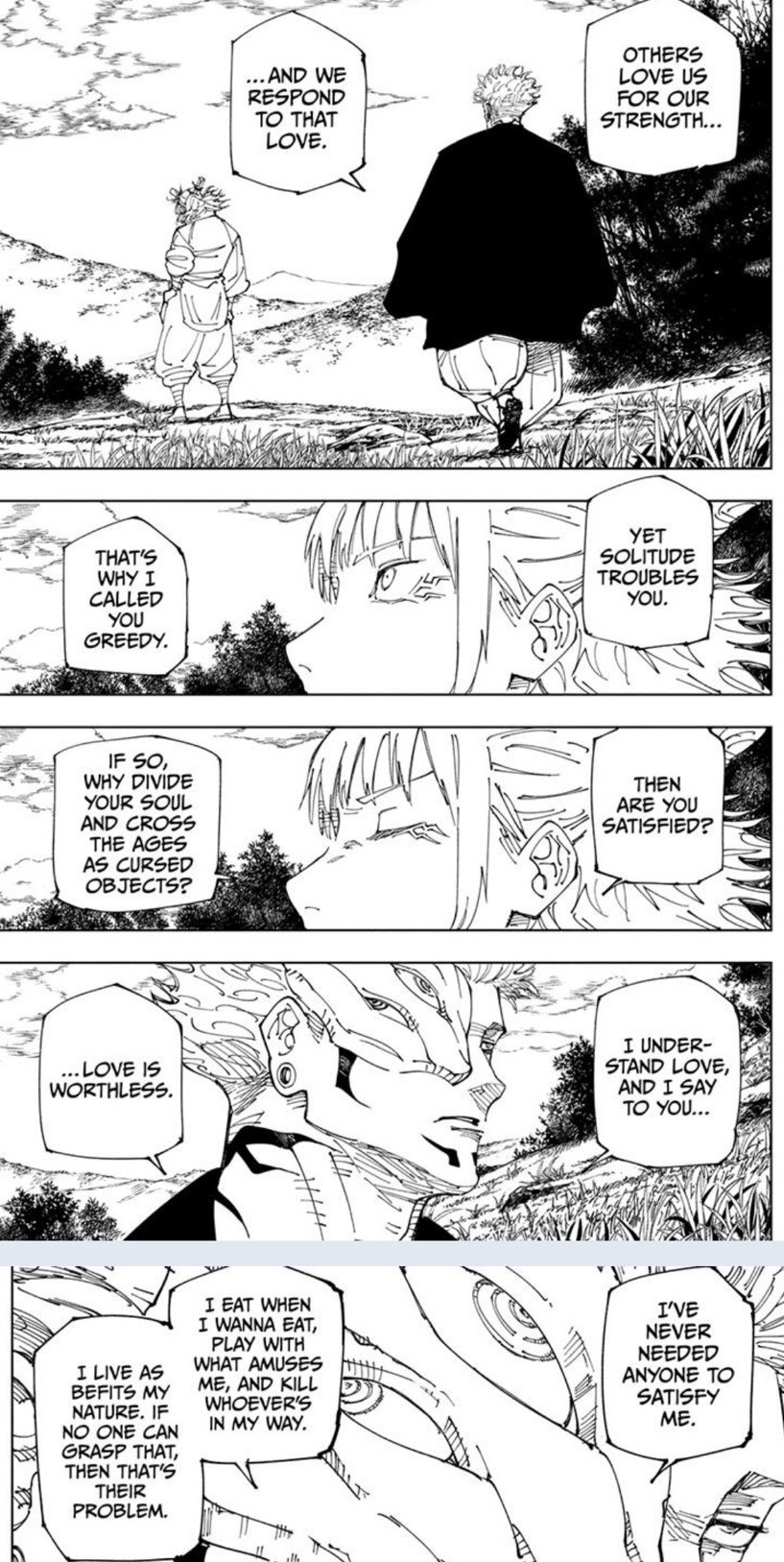
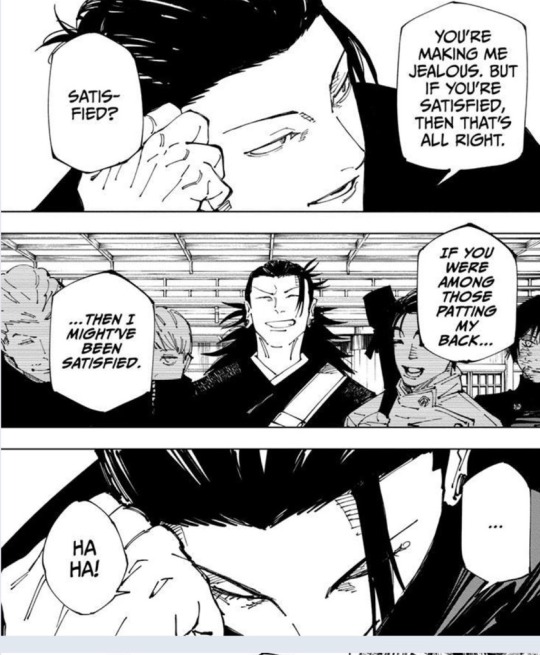
While love surrounds Geto, the theme that follows Gojo appears to be “the strongest” cursed; he was admired, revered, feared, and disliked by many. It truly breaks my heart, to think of what he had to give up to carry the weight of this for his whole life, until the very end.
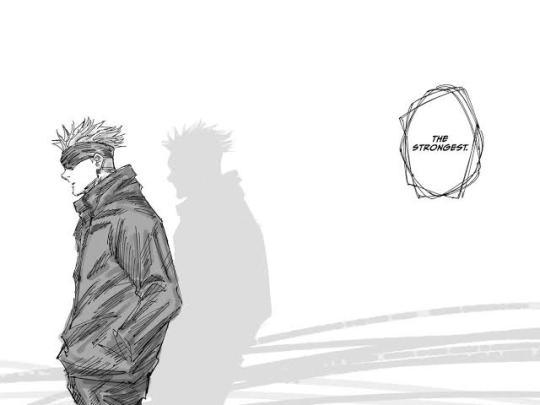
This looks like the most dizzyingly lonely picture of Gojo. It was indeed ironic to have it all but to embody what it means to have an unlimited void by being totally different.
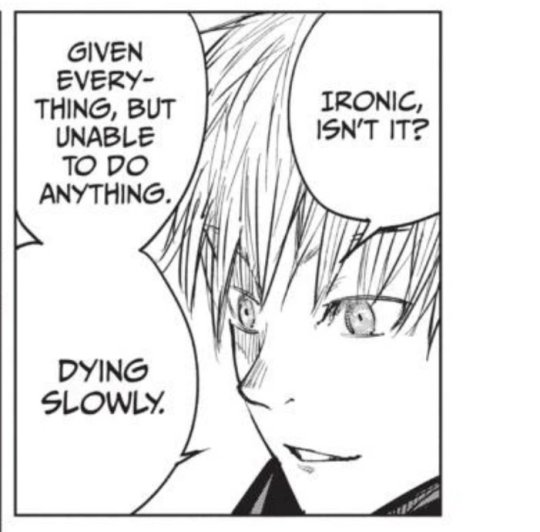
He suffered so much for his power and to have carried this strength. The sorcerer world was practically on his shoulders. The balance was up to him; everyone relied on him. Every time he tried to protect his love (geto) it seemed to fail. It worsened each time, ending with his own demise. But of course that’s just a dramatic interpretation - I don’t really mean/believe that, but it is one way to see the tragedy between Gojo and Geto. Strength at the expense of love; it plays out with the strongest this far as those identifying with this title are plagued by loneliness and do not know love.
They met before things got twisted within themselves, between them. Even after Geto left, Gojo seemed to be looking and waiting for him - to prove his trust for him almost as if he saw through his illusions and lies. Geto was the shadow (Yin) and Gojo was the light (Yang). Only the light can see through the dark. I’ll leave the gojo characterisation for another time / to other better writers.
For now, I’ll just say that I felt that he had planned for the possibility of losing to Sukuna (with the various things we see him do between scheduling the 24th and the actual day) and if he won, he’d just carry on the plan to cremate Geto on top of saving everyone and being a good example as the strongest. Worst case scenario, he would weaken Sukuna and I guess just die on the same day as Geto - idk, maybe as a form of redemption for one of his most painful experiences in life. Who knows?
I headcanon he was relieved to pass on, doing his part to defend the world that relied on him so much, with a big bang - a really fun fight.
And I’m glad they found each other at the end - the loved and the lost.
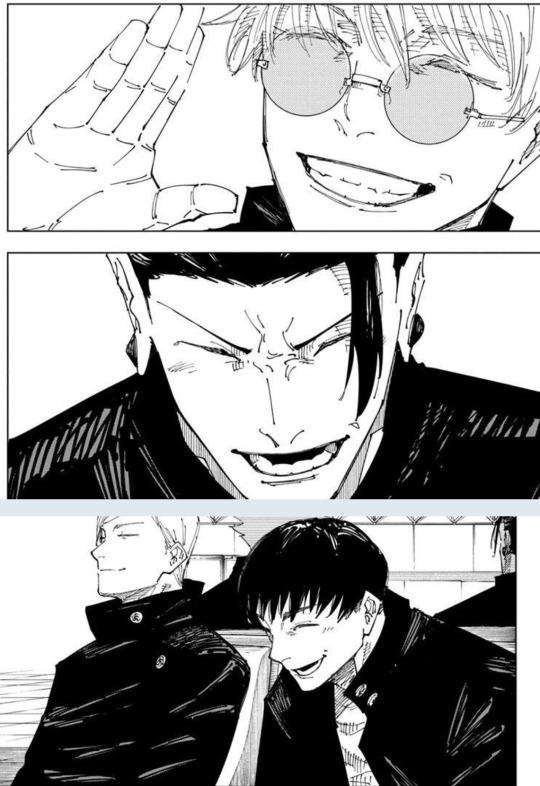
Back to Geto:
We don’t get much insight into what Geto wanted or felt aside from a world that was better for sorcerers, those he cared about. Even at the afterlife scene, or in subsequent chapters, we only hear from others rather than Geto.
Call me biased and delusional; I believe he didn’t kill the innocent despite saying he hated them all. He loved and hurt so strongly that he hated with almost equal force. He did want to force evolution and eventually extinguish all human kind, to him: the ignorant source of suffering, but I’m glad he didn’t manage to get Rika. I headcanon that he was aware he was losing himself by defying his own principles (to kill sorcerers) for his own gain. That, and Rika with a binding vow for a life, no less, was just too powerful.
In the official character book, Geto was described as someone who told himself that he hated humans a lot, like a reminder. He didn’t kill people indiscriminately. I’m sure he was well aware of how evil he had become but he had chosen, hadn’t he? He expressed to Yuta, that self-affirmation was incredibly important in his view. And the more he interacted with the students, I think the more his humanity fought back - I mean, he was standing there crying from being so moved by what he saw. He also let Yuta heal his friends. How villainous? Or how incredibly loving in spite of himself?
Geto has been shown to lie to others too: jjk 0: described having lied to the school about the conditions for obtaining a cursed spirit, and after defecting: upon taking stage for the first time, stating that the looking the part (wearing gojokesa) was important (ie lying). At his death’s door, he also prefaces with, no matter what anyone says - why would there be a need for that if he wasn’t telling a half-truth? He sought to avenge Riko (first person at the cult he killed after calling him onto the stage + cue mic throw) and the village represented a bunch of people who he slaughtered out of rage and ignorance. I’m definitely not defending him here - his actions are reprehensible. My headcanon view is that he didn’t know how to live with himself after snapping and that was the only path laid before him, which he ardently committed to.
I just think that he held onto a form of love/humanity still- Gojo and Geto both did. Without it, Geto would’ve become the Queen of curses due to Rika (uncaring about his family, or killing young sorcerors despite witnessing the students’ bond and yuta’s selfless power of love in jjk0) and Gojo may have focused on training at all cost without embracing Geto’s principles and becoming a teacher to change the jujutsu world - he could’ve become the next Sukuna and take the title of the King of curses instead - crowning them both King and Queen - instead of both the King and Queen contributing to their deaths. Anyway, I digress...
Geto appears very mother-coded in his protective and defensive relations to the girls, but also to Riko, Kuroi, and Gojo - especially after Toji had killed them. He was so fiercely trying to avenge and defend them, but failing that had a huge effect on him. Moreover, Haibara - innocent, glowingly positive - suffered an undeserved death. It weighed so heavily on Geto, that he didn’t defend Gojo when Nanami vented about leaving things to Gojo who seemed to take it all in his stride, almost insinuating that Geto, too, had little autonomy but to carry on that cycle of curse consumption he began to loathe.
Yuki also underlined the meaninglessness of the death / sacrifice / relationship rupture / suffering. And like the novel implies: Geto was too sincere for this world. He just loved too deeply and wounds cut him too painfully. At just 17... what inner resources were they forced to develop?
He was disillusioned by the system, but respected that Gojo had a place there. This is also SatoSugu indulgent: He never once attempted to talk Gojo into joining him, despite it being the most logical choice, but Geto was the emotional and loving kind - he prioritised Gojo over his ideals / himself. This man was willing to die trying to pursue his ideals, but didn’t want to try convincing his friend even if he know it might fail. What does that say about him? I think it says he loved Gojo. And Gojo loved him.
He masked like Gojo did : the infamous “yeah I’d win” and Geto’s “I’ve made my choice” and his face fell as he had his back turned, stating that he just needed to do it to the best of his ability. This may be headcanon but it does seem plausible to me. He was under no illusions about what he had done. To love was to turn away too. To love was to let the other go. Sigh.
Backtracking a bit: When Geto encountered the twin girls, who knows what entered his mind, but there was something that emerged from being horrified, enraged, and it gave birth to new meaning. He would take control and save them - from humans and the institution that made child sorcerors die. According to Gege, he became Papa Geto. (Kenjaku is also mum-coded but the antithesis of motherly love, with the womb protrusion domain and actually bearing children.)
This is of course not limited to feminine energy, as parents, both male and female, have protective instincts. But I’m not here to go into that discourse. Just stereotypically, and loosely speaking, Geto is very Yin energy. He is a big Mama Bear. With extreme maternal aggression. We see female counterparts do this in the wild more than males. And yes, of course both male and female are protective. Both geto and gojo were protective in their own unique ways. That’s for another post. Geto would rather die than have anyone come save him. In fact, the scripture behind him in the temple goes somewhere along the lines of “death to the weak”. If he had failed, he deserved to die. His family should live.
Gojo cares for others differently. And yes we know he died whilst defending others too. He is inherently more individualistic due to what he is with his gifts and noble heritage. He is less emotional and more cerebral, the only time we saw him lose his composure was due to Geto.
He allows his students to take risks and would allow them to fight in his stead, like in jjk 0 where Toge and panda were sent to be defeated by Geto. Tough love, as Gojo admits. This is also very Dad-like in the modern sense of the word.
In my subjective experiencing of the world, it’s almost like a husband who is only really emotionally vulnerable with his wife, and is otherwise the successful businessman, dad, and whatever else he is. Geto is much like a mum that he would walk away from her husband (lol, Gojo in this case) in order to protect them in a way she deems is best. Maybe I’m a little nuts, I don’t know. (Actually I am a little eccentric, but that’s by the by).
Now this is totally just satosugu indulgent: I headcanon that Gojo also “protected” / was possessive of Geto by making a deal with Miguel since the latter said he would curse Geto if he died, lol. Especially in light of the latest chapter where Miguel said he was spared by Gojo. (And i reckon Gojo was respectful of Miguel being Geto’s family, so he spared him for that reason too). I mean, Gojo had to kill his best friend, but this was his burden to bear, you know? It’s almost sickeningly intimate to allow someone to end your suffering, and be entrusted with that too. Ugh, ouch, my heart…..
Edit: I’m reminded of that scene where Shoko reflects on loving neither of them, like Gojo, Geto didn’t want anyone to be alone anymore either. Geto said he didn’t feel happy from the bottom of his heart. Gojo felt lonely (although he said it got better at the airport scene). They weren’t alone, but probably felt it… because of the absence of their true/first love? Larue stating in the panels above that Geto wouldn’t wish for them to fight seems like a nod to what Geto believed happened between him and Gojo. Gojo raised allies - be strong, don’t be left behind. Geto a family - get along, don’t fight. Just pointing out what my take is on the parallels I’ve observed.
That ends the brief analysis portion of what I wished to convey about what appears to surround Geto. He may not have been depicted much in the series, but his presence has been felt through the eyes of many. It made me wonder why did Gege do this?
This author deliberately wrote multiple people in the verse to love and follow him (and spare him a death sentence for 10 years) despite not agreeing to his ideals.
Perhaps it isn’t Gege’s focus, understandably, to give us a lot more insight from Geto’s pov, but there is certainly some kind of narrative he is pushing to depict how this man, cruel yet kind, is somehow one of the few he seems to portray in this way more than others within the sorcerer world at the very least. That his life was somehow a tragedy that he might not have really known the love at all? I wonder what Gojo’s last words were to incite such a heartfelt reaction - well done? Welcome home? You did well? I love you? My one and only best friend? Sigh, I guess it’s a secret between them.
There are others who have written metas on Gojo and maternal energy. If I find it I’ll link it! Otherwise, search through my reblogs! So many fantastic writers and thinkers out there!
Thanks for reading if you made it this far!
#satosugu#stsg#jjk analysis#jujutsu kaisen#jjk meta#jjk spoilers#geto suguru#jjk#gojo satoru#jjk satosugu#jjk theories#jujutsu kaisen meta#jujutsu kaisen geto suguru#jujutsu kaisen theories#gege akutami#geto meta#satosugu angst#suguru meta#jujutsu kaisen suguru#jujutsu kaisen geto#jjk miguel#jjk stsg#stsg angst#satosugu analysis#jjk character analysis#satosugu theories#jjk manga#jjk anime
233 notes
·
View notes
Text
Thoughts on Gojo Satoru
Gojo Satoru is a character with nuance.
With the release of JJK chapter 236, many people are shocked, confused and outraged at his characterisation at the end of his run in the manga. There are claims of character assassination, of blatant disregard for everything he has done so far, of telling instead of showing. The portrayal of Gojo as someone whose primary motivation was strength has left multitudes of fans reeling.
Nanami states that Gojo’s reason for wielding jujutsu was not his own survival, nor the protection of others, but rather in pursuit of wanton satisfaction. Gojo does not deny this and neither can we. After all, in chapter 233 it was stated by the narrator that as the possibility of defeat crossed Gojo’s mind, an intense feeling of satisfaction bubbled up in him as well. The truth is, Gojo loves jujutsu. He loves his own strength. He loves to use it, to show it off, to flex. He revels in his own power.
Gojo enjoys being The Strongest.
However, he doesn’t enjoy being The Strongest, alone.
The contradiction in Gojo is that, much like Sukuna, he sees himself as More Than. They are beyond humans, beyond curses, beyond anything of this world. They exist in a realm of their own. Make no mistake, Gojo harbours great affection for those around him. He says as much in 236 (みんな大好きさ寂しくはなかった - I really liked everyone and I wasn’t lonely). But he also admits that there was a separation between himself and other other living creatures. This phrasing is crucial. Gojo is effectively admitting here that from his perspective, other humans are as different from him as any other creature of this world. He doesn’t even really consider them to be the same species. This is further reinforced through his analogy of flowers. He states that you can admire a flower and make it bloom, but you don’t wish to be understood by it. Gojo cares for those around him and he cultivated his students to help them blossom, to achieve their potential, but they were flowers to him. They were inferior beings, incapable of understanding his superior existence, and so why should he open himself up to them? Shoko mentally chastises him for this in chapter 220, pointing out that she was right there alongside him even with the loss of Geto, that all his talk of being alone was idiotic because she was there and he could’ve relied on her. But he didn’t because in his mind, Shoko, like everyone else, is inferior and incapable of understanding him. To him, it is pointless to try.
But where Gojo differs significantly from Sukuna, is that Gojo desperately wants to be understood.
Gojo is so painfully human in that way. Perhaps he wouldn’t be, had he never known Geto. But he did know him, and for those 3 years, Gojo knew companionship. He felt understood by Geto because Geto, being equally The Strongest, was capable of understanding Gojo, in Gojo’s own mind. When Geto defected, he called Gojo arrogant in his own strength for saying killing all non-sorcerers would be impossible for Geto and attempting the impossible was pointless, when such a task would not be impossible for Gojo himself. He asks of Gojo, “are you the strongest because you’re Gojo Satoru, or are you Gojo Satoru because you’re the strongest?”. This exchange, unfortunately causes Gojo to misunderstand Geto’s reason for defecting, or at least to oversimplify it. Gojo’s takeaway is that the issue was in Geto’s inability to keep pace with him. This would further solidify his belief that he exists apart from all of humanity. Yet he could not make peace with that. He mourned Geto’s departure and disliked his newfound loneliness (which, mind you, was only the case because of that very belief that only an equal in strength can understand him).
This would drive Gojo to seek out Megumi, something he could have done at any point in the year since Toji’s death but had no motivation to do. The words he says to Megumi are crucial - “強くなってよ。僕に置いていかれないくらい” or “Get strong. Enough to not be left behind by me.” From this, two things are clear. First, that Gojo has no intention of slowing down. Second, that Gojo wants Megumi to be on his level. He’s essentially seeking out another Geto, one that he won’t lose to their own inability to keep up with him. He’s not willing to come down from his superhuman level to connect with the average - as previously said, Gojo revels in his own strength - but rather he wants others to ascend to his level. Gege stated in the fanbook that the reason Gojo went to find Megumi was because he’s seeking talented people, and the reason he helps problem children like Yuta and Yuji is because they’re strong so he doesn’t care about the other details. There is no mention of righteousness or kindness in his actions here. Now, the fanbook is secondary material so I will always err on the side of the main text taking precedence. But since the main text does not give us any explanation from Gojo as to his true reason for saving Yuta and Yuji, and Gege’s explanation in the fanbook on Gojo’s recruit of Megumi aligns with what we see in the manga, it’s likely that his interest in Yuta and Yuji is indeed purely due to their strength potential, at least at first. He does grow fond of them as people, and he wants them to enjoy their youth. But ultimately, his reason for raising them remains that, selfishly, he doesn’t want to be alone at the top.
His idea of “resetting the crappy jujutsu world” is making it so that life as a jujutsu sorcerer is as fun for everyone as it is for him, or at least as he imagines it would be if his youth hadn’t been interrupted by Geto’s spiral. Being a jujutsu sorcerer is Gojo’s job, but he doesn’t resent it at all. Because unlike all the other sorcerers who are here because they have no choice, or because they feel a sense of responsibility to protect the defenceless, or because they fear being killed by curses and using jujutsu as a retired sorcerer is illegal (looking at you, Kusakabe), Gojo is here because jujutsu is fun. He doesn’t feel that inherent drive to protect the defenceless (he actually finds that part of it kind of exhausting) and he doesn’t feel that fear because no curse could remotely threaten him, so he just gets to enjoy jujutsu for what it is. Gojo wants the same for his students. He wants them to enjoy the experience of life as a jujutsu sorcerer, without fear, and without suffering and being forced to question what the hell they’re even doing this for. If they can be as strong as him, there is nothing to worry about - nobody dies, nobody gets left alone, nobody falls behind. It’s an idyllic picture for Gojo.
There seems to be a misconception that 326 suggests that Gojo’s only reason for training the students was to eventually fight them at their best. That is not the case. Gojo’s love of fighting and Gojo’s desire for an equal are two separate things that only got amalgamated in Sukuna. After all, Gojo never sought to fight Geto. We know they scuffled sometimes, but it’s not like Gojo was constantly trying to instigate a death match. His desire for an equal is, on its own, simply a desire to be understood, something he does not believe is possible by a weaker being. He longs for companionship but won’t let himself find it in people he views as inferior. Regardless of having an equal, Gojo still loves his own strength. He loves toying with opponents, and showing off, and brutal violence. The more challenging the opponent/situation, the further he gets to stretch his limbs.
Fighting Sukuna presented Gojo with an opportunity to satisfy both of these things.
Does Gojo have anything against Sukuna or the way he lives his life? Not really. There isn’t an ideological opposition at play here like there is between Yuji and Sukuna, they just happen to be allied with parties who are in conflict. And, with them both being the jujutsu-loving, strength merchants that they are, they’re genuinely excited at the prospect of fighting each other. Gojo does want and plan to save Megumi, sure, but in any case that requires defeating Sukuna. He wasn’t bluffing when he said he’d worry about that later - fighting Sukuna genuinely takes priority, both strategically and selfishly.
In terms of the fight, Gojo has a blast. He gets to go all out like he’s never gone all out before. He’s pushed to invent things on the spot or legitimately just die. He doesn’t even have to toy with his opponent to keep the fight going, he’s sprinting from start to finish and is giddy with it. This is possibly the most fun he’s ever had.
In terms of the emotion, Gojo has been desperately trying to find someone as strong as him because (he believes) only they can understand him. It’s to the point that he has spent the past decade trying to basically build-a-bear some equals. Suddenly, he’s presented with one, fully formed, requiring no additional shaping on his part. It’s believable that he would be excited to take that chance of being understood, being seen wholly, by the only person alive in the world at this moment that he believes capable of wrapping their mind around him, since they’re both so far above every other living being.
And so Gojo fights Sukuna and pours everything he is into it. He pushes his body to its physical limits, he uses every jujutsu ability he’s ever learned, he comes up with new ideas on the spot, he throws out multiple max output attacks. Everything we have ever been told that Gojo is capable of doing gets put on show in this fight. He does all this because he wants Sukuna to see him in his entirety, because nobody else ever has. If he tried to unleash all of this on anybody else, it would kill them before he could even get a quarter of the way through.
See, on the one hand, Gojo’s self imposed isolation is born of his own arrogance but on the other hand, he’s also right in a way; because jujutsu is a part of the makeup of Gojo Satoru - its something he enjoys and it will always be a part of him. Yet he does not fight with allies because in doing so, he would be forced to limit himself. Like Yuta acknowledges in 235, if they were on the battlefield Gojo would have been unable to perform that AoE purple blast without harming them too. He must choose between being alone when doing jujutsu, or restricting himself in this thing that he loves. This feeds into the notion that they can’t understand him - he literally has to contain himself so as not to be too much for them.
He’s not too much for Sukuna, though.
Against Sukuna, Gojo gets to exist in his entirety, unrestrained, and for that he is appreciative. But we also see Gojo’s kindness, or rather empathy. He personally was satisfied by the fight - he was able to be seen wholly. He could simply have a “fuck you, got mine” mentality about it, but we see that he actually feels sorry to Sukuna for not being able to take everything Sukuna is the way Sukuna was for him. Sukuna could not afford to go all out if it meant dying to the other sorcerers as soon as the fight with Gojo ended. I believe this is why he looked less impressive throughout the whole fight - a Gojo giving it his all puts on more of a display than a Sukuna sticking to a pre-determined plan and doing minimal improvisation. But even though Sukuna didn’t let himself go all out, he still won. This would lead Gojo to believe (and it’s not an illogical conclusion) that if Sukuna had been going all out, Gojo wouldn’t be able to take it all. Gojo feels bad about it because he was unable to be for Sukuna what Sukuna was for him, he feels bad that Sukuna will seemingly never experience that same satisfaction (because, of course, if it’s not Gojo himself giving him that, he thinks nobody else can). This isn’t Gojo feeling bad about himself for being weaker, it is genuine empathy for Sukuna because Sukuna is someone that Gojo does actually perceive as the same species as him, not someone he necessarily considers evil or an enemy.
It’s not as bad as he thinks, though, because Sukuna did take immense enjoyment in this fight. It’s true that he wasn’t pushed to the point of having to give everything here, but he was still pushed further than ever before. Many people have confused “he wasn’t going all out” for “he wasn’t even trying” and that’s such a dichotomous way of looking at things - zero or one hundred. Sukuna was absolutely trying in this fight. For the first time in a thousand years, he actually felt the nervousness of possibly losing, because Gojo’s final purple could have killed him. It’s only because it was an AoE attack and not directly aimed at Sukuna that he survived, and visibly in the worst condition of his life. And after slicing Gojo, he praises him (“you were magnificent” is crazy levels of acknowledgment from Sukuna!) and admits that he will never forget him for as long as he lives. This is coming from the guy that called Gojo ordinary and unenlightened just 6 chapters prior. Gojo moved him, this much is undeniable. And Gojo’s smile in his final moment suggests that he heard Sukuna. In the end, he knows that he did reach him in some way.
(Brief side note: Gojo never says he would definitely have lost to Sukuna even without the ten shadows. What he actually says is simply that he’s unsure as to if he would’ve won. And that’s because he, unlike much of the fandom, recognises that Sukuna’s skill and genius understanding of CE and jujutsu mean that without the ten shadows, he would’ve approached the fight very differently, especially those domain clashes, during which it’s clearly stated that Sukuna refrained from using his CT or even domain amplification too much so that the ten shadows could continue adapting in the background. Take out that element and of course Sukuna has more resources freed up to put into fighting Gojo actively.)
So this is the nuance of Gojo’s character. He’s selfish, yet capable of true empathy. He cares deeply, despite his unfathomable arrogance. His motivations are questionable, without being malicious. He sees himself as beyond human, yet at his core is painfully so. He’s not a hero, nor even really a “good” person. But he influenced those around him in ways they will carry forever.
#gojo is a bitch and i like him so much#he’s so [squeezes him with my fist until the juices run out]#he is not normal! there is something deeply wrong with him!#(affectionate)#but he cares#not in the way ppl thought but he does#take him as he is or don’t#gojo satoru#sukuna#jjk 236#jjk analysis#jjk meta#jjk#duo: the one who will teach you about love#satoru
556 notes
·
View notes
Text
in the season two op, we see gojo with an umbrella, rushing over to meet geto. despite the fact that he literally doesn't need one, gojo very clearly brings the umbrella for geto; this is made obvious because this scene is intercut with shots of geto impatiently waiting in the rain and holding a bag over his head.
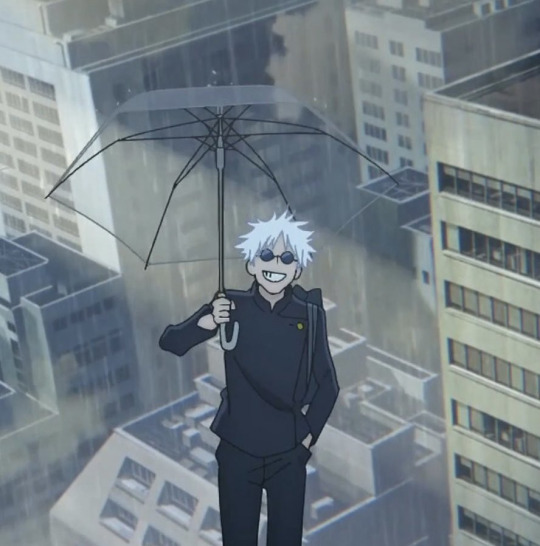
in the season one op, he's once again walking through the rain, but this time he doesn't have an umbrella.

the absence of an umbrella in the rain is stark in comparison to the season 2 op, where the umbrella is the focal point of gojo's stroll through the rain. in season 1, literally everyone else in the opening has an umbrella, making the absence of gojo's even more noticeable.
in both openings, he's walking in the rain. but only in one of them does he have an umbrella, despite the fact that he doesn't need it in either of them.
if you notice something is missing from a room, it's still there, isn't it?
#not to mention gojo is going to geto's FUNERAL in the second one#my jjk meta#jjk meta#jujutsu kaisen#satosugu#satosugu angst#satosugu analysis#jjk#gojo analysis#jujutsu kaisen meta#jujutsu kaisen analysis#gojo x geto#gojo satoru#geto suguru#stsg#gojo#geto#jujutsu kaisen angst#gojo angst#geto angst#geto and gojo#satoru x suguru#satosugu brainrot#stsg angst#stsg brainrot#gojo brainrot#jjk geto#jjk gojo#jujutsu kaisen season 2
2K notes
·
View notes
Text
Akutami this Akutami that. When Gojo "won" a few weeks ago people complained about Gege being greedy and keeping him alive to keep making money out of him (as if wanting money for your work was a sin). And now people complain about this death being "forced". Yk guys, I just think you're not happy with anything at this point and some people want to spread negativity over an overworked author. The same way people sent hate akutami when he didn't have the time to finish those pages in volume 17.
But I'll say thanks, Gege for creating such a great and complex character, wonderfully written who lived, loved and laughed, grieved and cried. A character so sadly mischaracterized as "just egoist and narcissistic" who had his heart broken so many times, his body literally ripped out, died and reborn as a god, who always gave his best.
I can't wrap my head about Satoru's life. People expecting the best from him, so they probably never actually congratulated him bc that was "his job" and what everything wanted from him. And Suguru being the only one who understood him and saw him as Satoru, not Gojo Satoru "the six eyes brat" just Satoru. His name being pronounced in such a lovely way during season 2 will always break my heart.
Also, Satoru and Toji being counterparts in the sense that Toji was born with nothing, and no one expected nothing from him, while Satoru had everything. Their fight, which was the first time Satoru felt alive and the point from which he became obsessed with being powerful.
Satoru, the funny and cunning teacher who wanted a strong generation. And he made it. He actually accomplished his dream of making a strong generation of sorcerers capable of thinking by themselves. It's all in their hands now.
Grew from a kid to a smart adult who proved he was the strongest of his generation. Maybe he wasn't the strongest of all times, and considers himself to not be enough, but for me? Damn, he is. He's the one who cared about the youth, who prepared them for the future. Who overcame a cursed love and loss all covered in blood, never surrendered, and still managed to stood up for what he believed in regardless the situation. That's what a strong person does.
So thanks Gege. Satoru has accompanied me for three years of my life. I loved him for three years and I will continue to love him in case he decides not to give another plot wist and leave him definitely dead.
I'll love him forever

#thanks gege I'm just in tears right now#Satoru is such a complex character and I love him so so much#I won't ever get to recover from this lol#He's more than a pretty face#jujutsu kaisen#@meyers#gojo satoru#geto suguru#satoru gojo#satosugu#stsg#jjk meta#kinda?#jjk spoilers#jjk manga spoilers#—meyers»talks🌸
477 notes
·
View notes
Text
No bc Satoru has this whole hallucination-dream-limbo sequence where he’s talking to Suguru about how he wanted to give Sukuna his all to get through to him and show him how he understood his loneliness only to have Suguru go “…you’re making me jealous.”
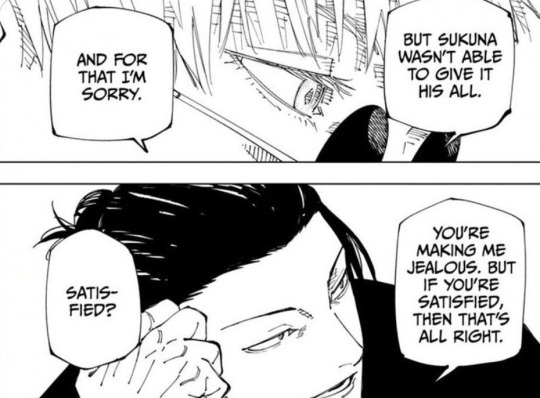
As an author, what Gege did here is genius because that is such a loaded statement to make in response to Satoru processing his fight with Sukuna. It can mean so many different things and we, the audience, are free to interpret exactly how Suguru meant it.
On one hand, you can say he said he was jealous because he wanted to be the one Satoru fought with all his might. He wanted to be as strong as Satoru, to match him in prowess, and hearing that Sukuna was the one to do it instead made him jealous.
On the other hand, you can say that he said he was jealous because Satoru recognized that Sukuna was lonely and wanted to get through to him, something that he was too late to recognize in Suguru when he was descending into madness, and that in turn made Suguru jealous because it was as if Satoru was saying “I recognized the loneliness in him and wanted to do something about it” when he failed to do that same thing with Suguru.
I personally interpret it the second way more (the first one is very valid, but I just see things the second way), because of the next lines.
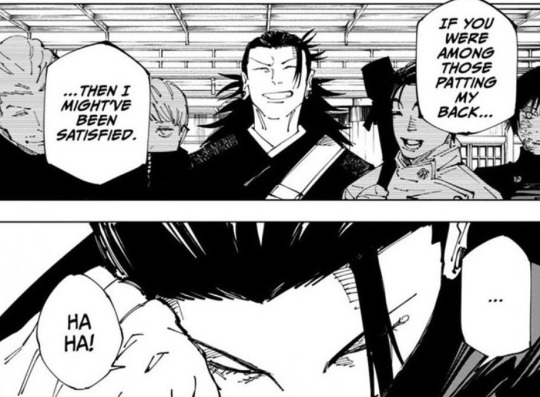
He made Suguru cry. While laughing. Once again, holy shit is that such a loaded scene. What did Suguru’s tears mean? We have never seen him cry before. Not when Riko died, not at any point when he was losing his mind, not even when he died by Satoru’s hand. So why, when Satoru said he wished Suguru was there to wish him luck before he fought, did he finally get brought to such strong emotion that he cried?
Was it because he was happy to hear that Satoru still thought of him, even in his final moments?
Was it because after all these years, Satoru never thought ill of him and pictured him there beside him, and he was relieved?
Was it because he regretted making the choices he did that led to him not being there by Satoru’s side?
Or, in a very indirect way, was it an admission of love from Satoru that made Suguru happy?
I wonder that, because of these panels from Chapter 238:
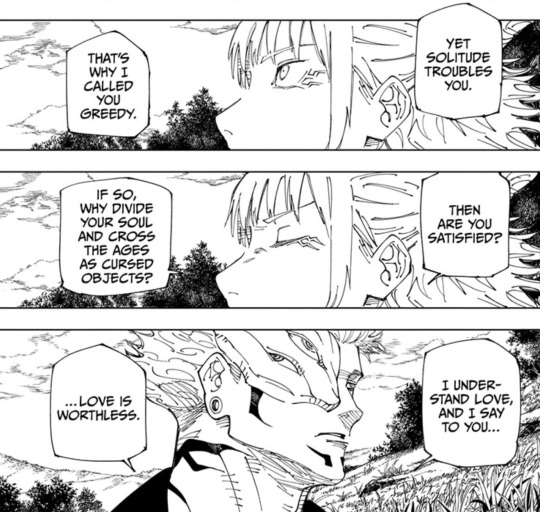
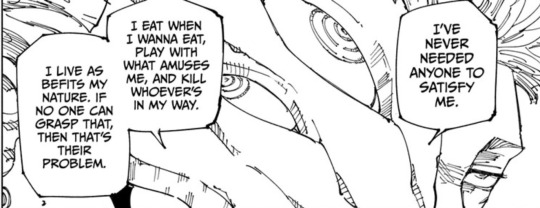
Kashimo asked Sukuna, “if you’re so satisfied being alone, why did you refuse to die and turn yourself into cursed fingers?”
Sukuna’s response is, “Love is worthless. I’ve never needed anyone to satisfy me.”
Which is a directly opposing statement to the one that Satoru had just made to Suguru.
Sukuna: I only have to worry about myself and I get to do as I please. I am satisfied by myself. I don’t need love.
Satoru: I worried about everyone else my entire life and I was controlled by the society. I was not satisfied, but I would have been if you had been there with me, Suguru.
That. Is. Powerful. Those panels imply that love is what made Satoru weak. He did not feel complete because he didn’t have Suguru. He had all of the power in the world, he had status, he had students that depended on him, other friends even, and he still was not satisfied because Suguru wasn’t there.
Sukuna on the other hand recognized how detrimental love was because of what it did to people, how it made them weak, and he decided he didn’t need it.
Those panels were such an indirect-direct conversation between Satoru and Suguru.
Essentially, they were saying:
Suguru: You fought with all of your might and I wish that you recognized my loneliness so that I could have been there with you
Satoru: I was at the peak of my power and I had the weight of the world on my shoulders, and I was allowed to go all-out to fight yet I just wanted you to be there with me
It’s just. Ugh. They’re saying they want each other in the most infuriatingly roundabout way.
#ive been wanting to talk abt this for a minute#just. the language.#satisfaction relative to love#it’s all related#satoru was not satisfied because he didnt have the person he loved#sukuna has abandoned all need for satisfaction and love because they are weaknesses#satosugu#jjk meta#satosugu meta#stsg#sgst#sugusato#satoru gojo#gojo satoru#geto suguru#suguru geto#jjk#jujutsu kaisen#jjk spoilers
2K notes
·
View notes
Text
Gojō Satoru's rude awakening

I'm refusing to let myself seriously entertain the possibility that Gojō can come back after chapter 236. However, that's because I'm trying to protect my future self from disappointment, not because I think it's implausible — and I really want to talk about this image!
A couple of days ago, @runabout-river shared an interesting theory about what might happen next for Gojō. The post itself is well worth a read, but it was the choice of the above image that really set my mind alight. This scene is fresh in our minds after the anime adaptation of Hidden Inventory, and timing is clearly never an accident with Gege Akutami. So, why is it relevant now?
We see Gojō giving himself over to his past, lost in his happy dreams of his youth, only for Megumi — Gojō's first student and a symbol of the future that he envisions — to bring him back to the present by telling Gojō, "You're the one who called us here, please don't go dozing off."
In other words, "You're the one who dragged us into all of this, don't go pretending this isn't reality just because it's nicer in the past."

In my immediate reaction to 236, I said:
Gojō's dying bloody smile shows he's at least happy in his final moments. [...] Although, if Gojō actually is at peace in death, maybe that's the reason Gege will bring him back. He'll *never* let that man be happy, I swear.
It was just a joke, but seeing @runabout-river's post made me realise that Akutami has already set a precedent for 'punishing' Gojō for looking backwards. When he's dreaming about his past, Megumi scolds him and brings him back to the present. When he 'lets his mind wander' to his blue spring in Shibuya, he literally gets locked in a box where time doesn't pass, only to immediately find himself at the bottom of Japan's deepest ocean trench when his students bust him out to fix the problem he created.

As a side note, in both of these moments, the anime adaptation played a melancholy version of Gojō's Limitless theme — the audio representation of Gojō's youth. I'll eat my hat if it doesn't play again when chapter 236 is eventually adapted (I shared some more insights into some of the easter eggs hidden in the season 2 score in my mini review of the Hidden Inventory soundtrack if you wanna read).
If Gojō dies here, looking backwards to his youth, then he's taking the easy way out and that's what I find hardest to swallow about 236. Gojō leaves what is potentially the most difficult conversation he'll ever have — telling Megumi the truth about his father — to Shōko. He leaves his students to deal with the fallout of his failure to cremate Getō's body. He's saddling the people he loves with the responsibilities he leaves behind, and that's not fair.
However, we won't know if that's what's happened for sure until the whole story is told. Gojō doesn't mention his students in this chapter, and lots of people were bewildered that he seems unconcerned about their safety in a world without him. While that could simply be explained by his faith that they've "got it from here", there's a chance that he genuinely didn't think about it and he's about to get a rude awakening as his punishment — hence, "I pray that this isn't just a delusion".
I would *adore* it if Shōko dragged him back to life kicking and screaming, hauling him away from his pleasant fantasy of youth to tell him, 'No, you and Getō don't get to leave me behind to pick up the pieces again'. Because isn't that Shōko as a character? The one who's left to pick up the pieces in their wake? The one to heal the wounds and lay the bodies to rest while everyone forgets she's even there?

It would be the most character development she ever receives, and I'd love to see how Gojō and Shōko's dynamic changes when he's not the 'Strongest' anymore. So, in Shōko's own words:

#jjk#jujutsu kaisen#呪術廻戦#jjk 236#jjk meta#jjk analysis#gojo satoru#ieiri shoko#jujutsu kaisen meta#jujutsu kaisen analysis#jjk spoilers#jjk manga spoilers#jujutsu kaisen spoilers#jjk leaks#i can't stop talking about this chapter#so i guess it might actually be really good???#i'm literally drafting another post right now 💀
448 notes
·
View notes
Text
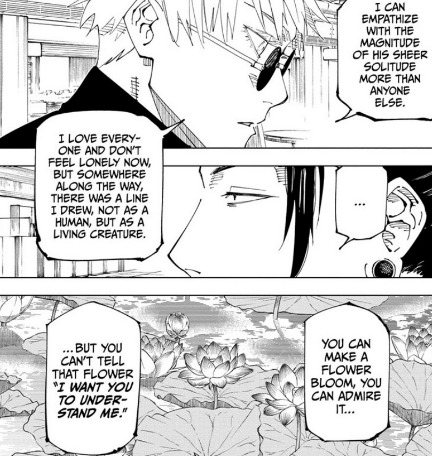
I WANT YOU TO UNDERSTAND ME
It's not surprising to me that Gojo's dying monologue he spent more time talking about his fight with Sukuna than any of his students. Gojo's priority from the beginning isn't to save Megumi but to fight all-out against a strong opponent, the line is: ""The Absolute Strong. The loneliness that follows. The one who will teach you about love is..."
This fight is basically the climax of Gojo's identity crisis which has been a long running issue for him throughout the manga. He's simultaneously a self-confident individualist with an overpowering sense of "ego" and a person with little idea of who he is outside of the role in society that was given to him. Gojo went into the fight looking for someone capable of understanding him, the fight is about Gojo seeking an answer to who he is, that's why he fights and that's why he loses.
Gojo is Not Normal
Nanami's statement is misinterpreted I think.
"You live for Jujutsu. You don't wield it to protect something. You use it solely for the sake of satisfying yourself."
A lot of people took this to mean that Goo didn't care about anyone but himself, even though Gojo directly contradicts this earlier.
"I love everyone and don't feel lonely snow, but somewhere along the way there was a line I drew, not as a human but as a living creature."
He states he does love other people, if only from afar, he just doesn't understand them. Gojo can't make other people his reason to fight, because he only understands himself. He only sees himself. He can only fight for what's inside himself.
"You can make a flower bloom, you can admire it, but you can't tell that flower 'I want you to understand me'
Gojo's students are the flowers. Itadori, Fushiguro and Nobara are all named after flowers. He's raising them up to be as strong as him, he's fond of them, but he doesn't think they relate to him because he exists in a different category of other people.
A lot of people want Gojo to be a more traditional caring mentor figure like Kakashi or Aizawa they're missing what's really interesting about his character. When Nanami says "Gojo only cares about being the strongest" it's true because his entire character is written around the statement "I am the strongest". He is conceptually about what it is like to be the strongest man in existence. That is the character concept, and Gojo's entire identity crisis revolves around that he's built up his personality around being the strongest at Jujutsu and nothing else.

Gojo can only fight for his own ego and self satisfaction as Nanami says, because he has nothing else, he has no identity outside of that.
However, before I get into why I want to point out that Gojo is not normal. It's not because someone on his power level is fundamentally incapable of relating to other people, but Gojo himself...is not right in the head. He's making an active decision to choose not to empathize with people whatsoever, it's not just that it's hard to understand him, it's that they can't understand him.
Gojo talks about his students like they're members of another species. They're flowers. They can't relate to him on a human level because he's something other than human. A friend had an interesting reading on why specifically it's flowers Gojo chose for his metaphor.

Plants are less sentient than insects, they don't contemplate anything they are just taken care of by their gardener and grow towards the sun. That's how differently he sees himself from others.
I wanted to include this take from @kaibutsushidousha as well.

Gojo's not from the planet mars he's a human who has human emotions and human psychology like everyone else, so that's simply not true, but Gojo believes it is and that belief influences how he interacts with everyone.
Gojo can't see himself reflected back in other people for some reasons that aren't his fault and some reasons that are. Gojo has been from birth, treated as different from everyone around him, not for anything he really did but because he was born with a really strong jujutsu ability. He's a literal chosen one. He always seen as the six eyes user, the strongest, before he was seen as a person. His entire life has been defined entirely by the abilities he was born with, he was born to be a Jujutsu Sorcerer so of course that's what he builds his entire identity around.
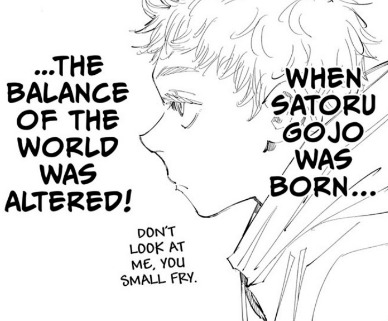
Not only is he told that he's categorically different from others, but he also believes it. We know little about his early childhood besides Gege's statements that he was spoiled, but we do see later on in childhood there are people who are willing to treat Gojo normally despite the position he has as the strongest. This is when it starts being Gojo's fault that he continues to see himself as different from other people.
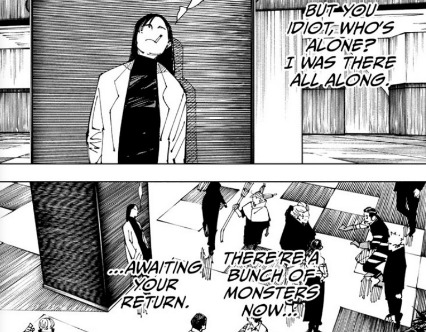
Shoko, Gojo's closest confidante in his schooldays after Geto's days basically tells him that. She's been with him for years and yet he still has the audacity to act like he's all alone in the world. Even when people try to treat Gojo normally and relate to him on a personal level, Gojo actively ignores their presence in his life like he did Shoko because he's not only been told he's different from other people because he's stronger, but he believes it and he's built his entire world view around it.
This is why the only person that Gojo ever let in was Geto, because Gojo believed that Geto was someone who could stand on top with others. THe only person who could believe the strongest, or teach them about love was someone equally as strong. Gojo just happening to meet another sorcerer who was special class as a teenager not only allowed him to have a friend, but fit perfectly into his narrative that he was separate from others and only someone as strong as him could understand. There are people like Shoko and Nanami who treat Gojo normally despite the fact he's the strongest, but Geto was the only one Gojo met in because he met the qualifiaction of being someone equally as strong.
This isn't really the case for Geto. Geto comes to see weak people as inferior yes in the sense he sees Non-Jujutsu Sorcerers as inferior, but Geto is capable of making connections to other Jujutsu Sorcerer. Geto has his family, he has Nanako and Mimiko and the rest of his followers who he all cares about equally. Geto met all of them and chose to relate to them, he even tells Gojo after killing his biological parents that he's choosing who his real family is now.
"It wouldn't be fair if I made an exception for my parents, now would it? Besides my family now consists of more than just them."
Geto demonstrates someone as powerful as Geto can make a choice to relate to other people. It's shown in the way that Geto treats Nanako and Mimiko, he is their father and he raised them as his daughters. Compared to how Megumi is just a student to Gojo. Gojo's only invested in making Megumi into a strong Jujutsu Sorcerer, because Gojo doesn't fathom connecting to someone weaker than him. He's only their to raise up a strong sorcerer, whereas Geto who's capable of connecting with people in other ways is raising up Nanako and Mimiko and they're connected as parent and child.
Geto and Gojo are similiar in a lot of ways, same level of strength comapred to the rest of humanity, same god complex (and yes it is a god coplex, there's a reason the two people Gojo relates to are Geto who has constant religious imagery associated with him and Sukuna who's literally satan) and yet Geto shows someone roughly Gojo's power level can make connections to others Gojo just chooses not to.
This is where I'm stealing from a friend's post a bit. @theanimepsychologist points out that Geto notices the beginnings of Gojo's identity complex soon after it started with Toji.
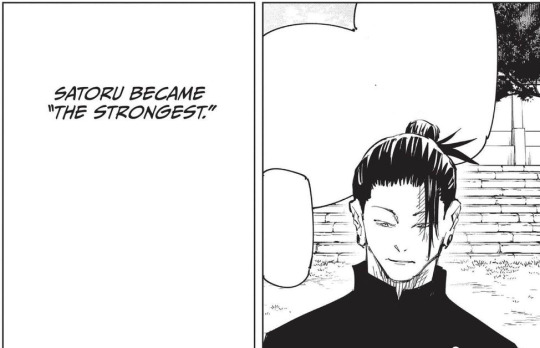
I always thought of the panel above as Geto being jealous of Gojo surpassing him in strength but, in retrospect, I think Geto’s disappointment had more to do with Gojo’s sense of self over-identifying with the title “the strongest” and how that made him harder to relate to, which is one of the main themes in this chapter. I’ll come back to this in a sec.
But first…
Quick depth psych segway. I think I’ve said this before, but it bears repeating again that an overwhelming sense of self is all ego. There’s nothing wrong with ego per se.
The problem is that an over-identification with ego means inherent separateness because, as an organ of the psyche, the ego sense of self is what gives us a separate identity from the collective.
Geto notices that Gojo is drawing a line between himself and other people, and pulling away because of that because people in the second category of weak can't possibly understand the strong and he's reacting to it. Geto is also the only person to underline to Gojo himself that he's unsure about his own identity.

Gojo knows he's the strongest, but he doesn't know anything about himself besides that, or even what being the strongest entails in his relation to other people. He's never constructed an identity outside of it in part because he's never had to, nobody has ever challenged him for his title as the strongest, and he also fits jujutsu society's mould perfectly. He's perfect at what he does, why would he need to change? Why would a person who reached enlightenment at seventeen need to reflect upon himself or figure out who he is? You can't really become more enlightened.
The other reason he's never constructed an identity is he's never interacted with anyone on equal terms. Metaphorically Gojo exists in a vacuum of human interaction. How appropriate is it in a way that he was sealed in a box where time didn't move completely alone for who knows how long, because that's kind of just how Gojo sees himself in relation to the rest of the world.
As Psycho points out an unregulated ego results in an inherent separateness from the collective. People don't exist in a vacuum however. We wouldn't know who we are if we were entirely alone. We are defined just as much as ourselves, as we are by our interaction with others.
Ich and Du, translated as I and Thou is a book by philosopher Martin Buber. His two main porositions is that we may address existence in two ways:
The attitude of the "I" towards "it" towards an object that is separate in itself, which we either use or experience.
The attitude of "I" towards "Thou" in a relationship in which the other is not separated by discrete bounds.
I -> It is the world of sensations. If I am looking at a chair, I say "This is a chair. This chair is an eyesore." I am seeing the chair. I don't relate to the chair.
I -> Thou can be used to refer to a relationship between human beings. You don't experience the human being., you can only relate to them and what that relationship means to you. He goes on further to say that love requires a subject -> subject relationship. To love someone means you have to relate to them as if they are another being, you can't love an object.
He's a philosopher to put forward that it's human's connections with each other and their ability to relate to each other that brings meaning to life. Gojo in Buber's terms is only experiencing the world around him, not relating to it. How appropriate of someone with the six-eyes, an ability that gives him sight far better than anyone else to see himself as only an observer to the outside world, like a floating pair of eyes.
The choice that Gojo makes not to relate to other human beings on an equal level, not only isolates him, it affects his sense of self. People cannot exist within a background. Gojo's like a vampire who can't see his own reflection. ? It's all because of this caveat that Gojo himself has set up that no one can possibly relate to him unless they were equally as powerful as him that he can't see himself in others. He can't see himself in others, he can't find anyone to help him understand himself, and therefore his identity crisis goes unresolved.
Twitter user @ det_critics pointed this out that the question: "Take away his strength and what is he?" isn't one Gojo has an answer for, and one he's actively been running from.

As I said Gojo literally doesn't have a reflection, we see that in story when the prison realm opens its eye and it's just a void where Gojo's face is supposed to be. Gojo choosing not to think of himself as the strongest is also a choice not to think about who he'd be if he wasn't. A question he evades over and over again by telling himself that he can't be understood by people who are weak b/c he categorically exists on a different plane of reality.
When he does look for an answer it's telling just how not normal Gojo is in who he chooses to empathize with: which is Sukuna.
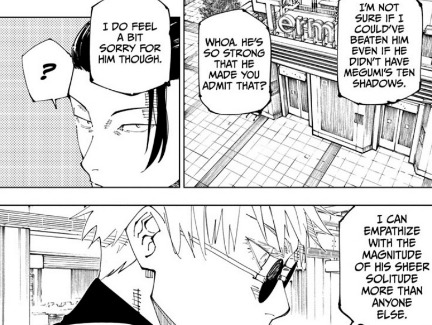
This is who Gojo as chosen to be the only other person besides Gojo he felt he could relate to. The same person who monologues about weak people like this.


The same person who monologues that weak people shouldn't even be alive, they should be culled. Sukuna sees weak people as insects. Gojo sees them as plants.
The first person that Gojo relates to as a subject rather than an object Geto is cut short, the next person he relates to as a subject is Sukuna of all people. He chooses to see himself in Sukuna, because Sukuna validates that incorrect idea Gojo has that someone as powerful as him could never possibly be understood by other people. After all, Sukuna the strongest sorcerer of all time isn't even really human anymore, he's a curse a calamity. For Gojo who doesn't see himself as relatable to other human beings this is validation of that mistaken notion.
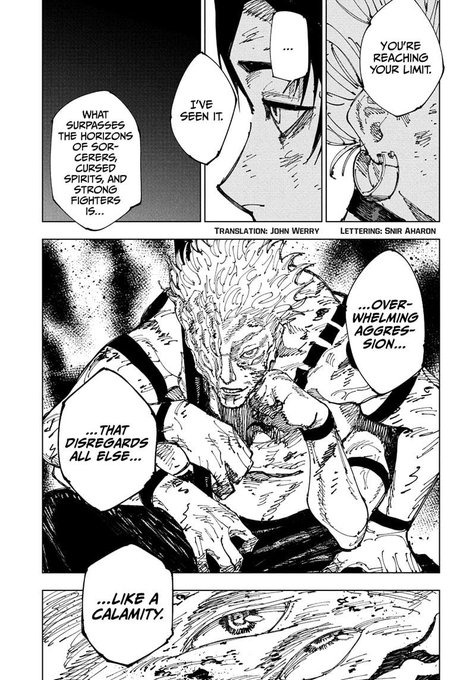
It's also telling of how much Gojo's own identity issues have warped him that he finds a curse personally relatable, and even pitiable because it's lonely. Sukuna, who's main problem is that he's bored because a life of killing people is unfulfilling and it's turned him into an adrenline junkie. This is who Gojo's personally chosen to relate to because they both only see the world in the category of "the strong" and "the weak."
Gojo's viewpoint of other people is mistaken for several reasons, but one interesting one was pointed out for me by Psycho. He refers to his students as flowers, but they're lotus flowers. Lotus flowers mean many things, but they're seen as symbols of purity because they rise up from the mud. Gojo is only looking at the flowers, not the mud they rise from .
"No mud, no lotus. The mud is what makes us who we are, and no one can 100% understand what wading through the mud feels like. I think people see oh shiny lotus, the outcome of wading through the mud but they overlook the self because we live in an outcome oriented society.
Gojo is someone who doesn't see the mud and therefore doesn't relate to the personal struggles of others. Which sabotages a lot of his personal relationships. Which like, to bring Megumi into this, Megumi is proof that Gojo IS NOT NORMAL.
Megumi is the kind of special genius that Gojo is, he's born with the strongest technique one capable of killing Gojo, but he doesn't become a special class at seventeen like Gojo, nor is he interested in doing that because Megumi is an entirely different person with differnt personal struggles than Gojo. He has all the raw potenital that Gojo does, but they have wildly different upbringings. Gojo was primed for success by being the spoiled child of his clan, while Megumi is an abandoned child. It proves again Gojo's maxim of people who have that much power are inhuman and don't follow human psychology is wrong because Megumi has all the potential to be as strong as Gojo, but he's just a normal kid. Megumi is still wading through the mud and Gojo doesn't see that.
GOJO IS NORMAL
Jujutsu Kaisen seems to be following Buber's logic on how identity is defined by the interactions we have with other people, because there was a period in Gojo's life where he did create an identity outside of being a sorcerer and that's when he was Geto's friend.

In the afterlife we even see him regressing to that previous state of being. There was a period for three years in his life that Gojo was something besides being the strongest, and that was when he was Geto's friend too. If Jujutsu Kaisen is about how identity and meaning are both constructed from the interactions we have with other people (subject -> subject) interactions then it's telling that Gojo reverts to his seventeen year old self because that was the first and only time in his life he was capable of relating to another person, and acted like a fully developed person outside of the role of sorcerer he was born to play.
If identities are constructed though that means they're not inherent. Gojo is not inherently the strongest, just as he's not inherently different from other people. This is different from what Gojo's been told his entire life. He was born the strongest. It's inherent to his identity, a fundamental part of who he is. Therefore people who are strong are inherently different from those who are weak, it's something internally different about them which makes it impossible for Gojo to comprehend the motivations of weak people.
Rather than just strong and weak being constructed categories. Gojo's the strongest at Jujutsu but if you took him outside of Jujutsu and asked him to work any other job he'd no longer be the strongest. He's only the strongest as long as he remains in his fish bowl that is Jujutsu Society. However, Gojo believes differently, he believes being the strongest is what he is, it's something inside of him, and something that makes him fundamentally different from others. This is the line that Gojo has been told due to being born with the six-eyes and this is what Gojo has bought.
This is also what his ability the limitless symbolizes, no one in this world can touch him or reach him, he exists somewhere else. However, the limitless can be breached and Gojo has been shown before there are others capable of touching him.


Toji is the first and only living human being to challenge him, until Sukuna comes along. However, Toji does arguably more in story than just give Gojo a good fight. Toji full on traumatized him, soemthing which Gojo refuses to acknowledge. Toji is the beginning of the end of Geto's friendship, the death of Amanai Riko sends Geto on a spiral for an entire years, and drives a wedge between Geto and Gojo's friendship when Geto self isolates and Gojo doesn't know what's wrong with his friend.
Gojo also experiences what it's like to be defeated for the first time in his life, and his response is to perfect the limitless so he runs it constantly all the time. Remember, before that he was exhausting it doing it for three days in a row, and when Geto told him to take a break Gojo reassured him he wasn't worried because he knew Geto had his back. Gojo was someone who could let down the limitless before that, but afterwards Gojo always insists on fighting alone with his shields up all the time. All to deny that feeling of vulnerability that Toji inflicted on him for the first time in his life, something he remembers years later, you know like trauma.
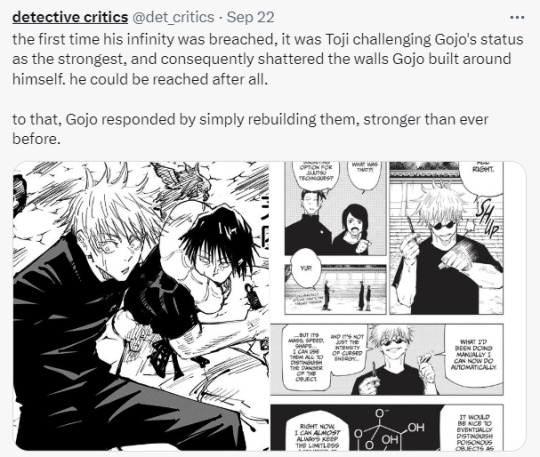
There are times when Gojo is reminded that it's possible he's the same as anyone else, he can experience human weakness. Geto's fall is another time, one post says it's particularly challenging for Gojo to comprehend why Geto would defect because he saw Gojo and himself as above others and therefore immune to human weakness.
gojou 100% has a god complex and thats why getous downfall hit him harder than anyone else. he saw himself and getou as above everyone else and exempt from ‘regular’ peoples flaws, he never thought either of them could be led astray and when getou finally snaps hes bewildered that something like that could ever happen to either of them. hes not just heartbroken over his best friend becoming an enemy, hes thrown for a loop because getou, the one person he thinks of as just as above everyone else and incapable of failing as he is, could ever do something wrong, could ever be wrong. hes finally put into a position where he has to face the fact that hes just as capable of screwing up as anyone else and he can’t make sense of it. gojous hesitance in killing getou isn’t just a byproduct of their friendship, it’s also him realizing that it could have easily been him on the other side of the conflict, which breaks the illusion of him being better than everyone for a second. and like that’s still not enough for him to reject this idea, personally i think that his comment about him and getou being 'the strongest’ in volume 0 is indicative of the fact that despite everything he still hasn’t grown out of this delusion.
Gojo has trauma, because he's a human being with human psychology. He makes mistakes, he has terrible past regrets like his friendship with Geto gone wrong, but he doesn't acknowledge those things because as stated above Gojo thinks he's immune to having regular people flaws. Gojo seeing himself in another category from regular human beings also allows himself to deny an vulnerability, because the strongest isn't supposed to have weaknesses. Seeing yourself as too distant to ever be touched by others also means they can never hurt you, emotionally or otherwise, an extreme form of the hedgehog's dilemna which is explored an Neon Gengesis Evangelion, an existentialist piece Gege takes obvious inspiration from.
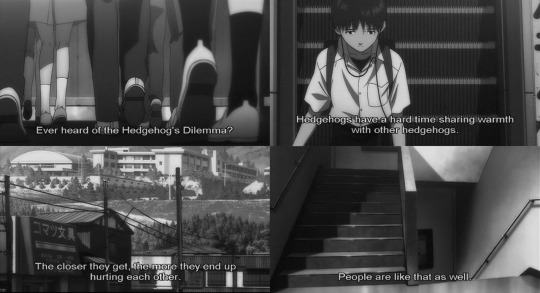
The fact that he avoids other human beings, not because he's fundamentally incapable of understanding them but because he's distancing himself from human feelings like loss, pain, suffering these weaknesses that are part of the human experience just proves he's the same as everyone else. If he wasn't capable of feeling those things he wouldn't avoid it, he wouldn't spend ten years mourning Suguru but not killing him directly until he was forced to on December 24th, he wouldn't be trapped by the box because seeing Geto alive made him have a three minute long trauma flashback.
Gojo is a normal human, with normal human emotions and human psychology, albeit twisted from the power he was born with and his unique viewpoint of the world but he doesn't believe that he is. He uses that as an excuse not to interact with others and because of this his identity suffers. Gojo is someone defined by how limited he is in the story despite having limited power.
Gojo fails as much in the story as he succeeds. As my friend @justapanda put it.
"But, it loos like being strong isn't enough..."
Another point could also be made here that, regardless of being the strongest at this point, Gojo was incapable of stopping his closest friend from straying down a dark path, which is perhaps Gojo’s greatest failing in the series. This failure also comes back to bite him much later on as Kenjaku’s ace in the hole to finally checkmate Gojo involved surprising him with the now possessed body of Geto, which distracted Gojo long enough for him to be successfully sealed by the prison realm. Once again, the vast amount of power that Gojo had attained turned out to be completely useless in preventing his own sealing, which has now placed him in an inactive role for over half of Jujutsu Kaisen’s duration. Earlier in the story, Gojo once said: “Ironic, isn’t it? Given everything, but unable to do anything.” when referring to the function of his own domain. This was another intentional use of foreshadowing to describe the dilemma that Gojo was inevitably going to face himself. Satoru Gojo is no limitless man, for no one man is without his limits."
Another point could also be made here that, regardless of being the strongest at this point, Gojo was incapable of stopping his closest friend from straying down a dark path, which is perhaps Gojo’s greatest failing in the series. This failure also comes back to bite him much later on as Kenjaku’s ace in the hole to finally checkmate Gojo involved surprising him with the now possessed body of Geto, which distracted Gojo long enough for him to be successfully sealed by the prison realm. Once again, the vast amount of power that Gojo had attained turned out to be completely useless in preventing his own sealing, which has now placed him in an inactive role for over half of Jujutsu Kaisen’s duration. Earlier in the story, Gojo once said: “Ironic, isn’t it? Given everything, but unable to do anything.” when referring to the function of his own domain. This was another intentional use of foreshadowing to describe the dilemma that Gojo was inevitably going to face himself. Satoru Gojo is no limitless man, for no one man is without his limits.
Gojo has moments where he brushes up against the idea that he's not capable of doing everything, that he has faults and fails like every other human being. However, that feeling never really lasts for long. He always tends to double down on his belief that he's the strongest rather than facing his faults because that's where he's comfortable. Gojo can't see himself reflected in other people and therefore is not capable of reflecting and critically evaluating his faults. Not only that but avoiding looking too critically at those losses, he also stops himself from feeling the pain of those losses and denies that vulnerability.
Gojo exists on another plane from other human beings, and therefore why would he experience human sadness and pain? All he feels is a vague sense of loneliness and unfulfillment because he's been so alienated from his own emotions and in Gojo's mind that's better than struggling with weakness. Who would deliberately choose to be just like everyone else when you can be special? Why get close to others when the hedgehog's spines are just going to stab you? However, people form connections because of their weaknesses. Humans cooperate with each other because they are a social species. All of society exists because people divide labor and help each other out. Even Gojo can't say there's no point in his life where he was weak, because he was cared for as a child and raised in a family. He didn't come out of the womb a fully formed individual. The darwinian survival of the fittest, and the black and white strong vs. weak way that Gojo sees the world just doesn't exist, especially in modern society. There's nothing wrong with individualism, but the extreme end of individualism is wrong because no one exists in this world alone you share it with everyone else.
Gojo doesn't even see that though, because he's not living in the same world as everyone else. In his mind the limitless makes it so he basically exists on another plane of reality, but again the limitless can be breached.

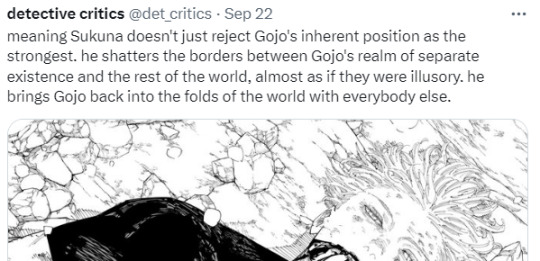
Detective critics basically said that Gojo's delusion was always a false one, he always existed in the same world as everyone else, he simply deluded himself into believing otherwise. There are reasons for this, his upbringing, trauma and not wanting to face the pain of that trauma, but it's still a choice he made. Gojo didn't want to live for other people, he didn't want to relate for them, so he lived for himself pursuing his own strength. Ironically, it reflects Toji's own decision to take pride in neither himself or others and live only for the sake of showing that the Jujutsu World that rejected him was wrong.

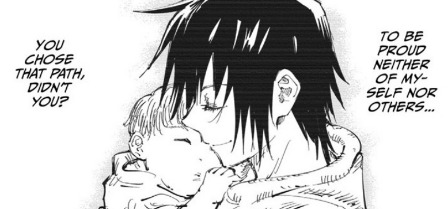
Toji chose to live a life where he only lived to fight and prove he was stronger than the sorcerers who rejected him. He chose it over his own son Megumi, abandoning him in order to continue his lifestyle as a mercenary. He even chose it over continuing to live because he stayed and fought against Gojo to prove he was stronger than the pinnacle of Jujutsu. Toji lives for strength, and he is someone even Gojo respected the strength of, but what else does he have?

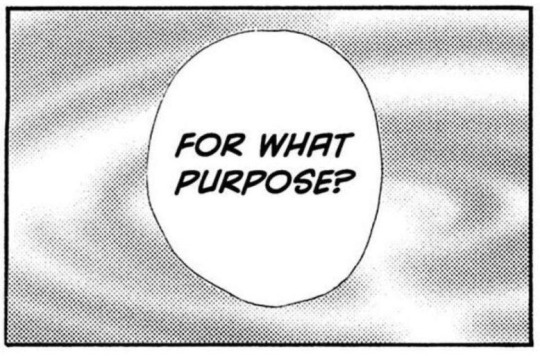
Toji's identity is unstable, he doesn't really live for any purpose, he kills people then blows the money gambling, he jumps from women to women to mooch off of them, he's also mentally unstable as well he shoots a little girl in the back of the head and feels nothing. The instability comes from his isolation, Toji is rejected by everyone the same way that Gojo is lauded by everyone. But Toji goes on step further in that he fails to construct any identity outside of being rejected and his entire life is spent rejecting the people who rejected him. Why does Toji want to be strong, he doesn't know. Purpose is something you have to construct for yourself, because there's no inherent meaning to life. Identity is something that's constructed by both yourself and your interactions with others because people aren't born inherently one thing or the other.
Gojo and Toji just refuse to do this, and only focus on themselves and the goal of being stronger. In Gojo's case I'd argue he doesn't fight for other people because he doesn't feel that connection with other people or rather he doesn't let himself. Hedgehog's dilemna to the extreme. Gojo only fighting for himself isn't Nanami calling him a selfish person who doesn't care about others, it's sad because Gojo never found any other reason to fight or meaning to his life but by getting stronger for its own sake.

Gojo only fights for the sake of satisfying himself, but here's the clincher, he's unsatisfied. Not only did he fail in his goal of giving Sukuna the fight of his life, because he knew Sukuna was holding back on him, but also admits to Geto that what would have really been satisfying is if Geto was there with him to pat him on the back.
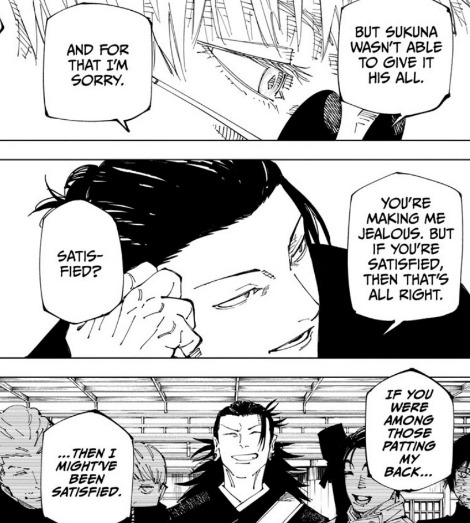
He's failed on both fronts, he's failed at being the strongest and he's failed at making a connection to the people in his life. Gojo and Toji die in pretty much the same way, they die standing up in the middle of battle, but their last thoughts aren't of disappointment that they lost but their loved ones.

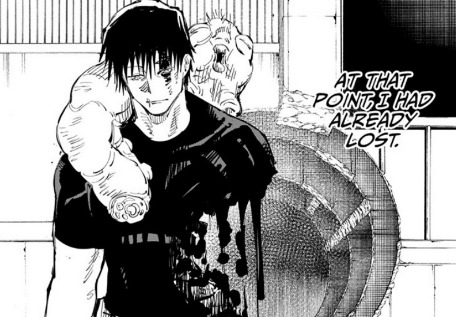
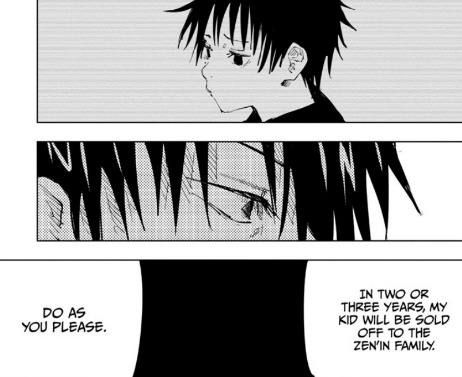
They spent their entire lives believing they were stronger and therefore different than others, and fighting to satisfy their ego and what does it amount to? Toji lived a life of hedonism and then died abandoning the one person he genuinely loved. Gojo has failed his stated goal of revolutionizing Jujutsu Society and dies before he can see whether or not his dream of a reset Jujutsu World will even come to fruition.
They belived they were someone stronger and therefore inherently better, and are put in their place when someone stronger comes along. They die just like all the other mortals. They believed they were alone so they died alone. It's sad and it goes to show how destructive being "the strongest" was to Gojo's identity in the end. Gojo thinks he's Sukuna but Gojo doesn't want to be Sukuna, because Sukuna's alone, and unlike Gojo you could make the point that Sukuna's not a human being who has human emotions because he's a curse. If Gojo was truly someone who could understand Sukuna he would have been truly alone the same way Sukuna is, and that's not what he wanted.
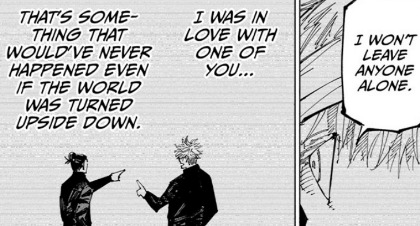
It's too bad Gojo never thought seriously about what he wanted, and therefore learned his lesson too late. He was always looking for someone he could relate to, except for in the people who were right in front of him.
#gojo satoru#jjk meta#satosugu#geto suguru#ryomen sukuna#jjk 236#jjk 236 spoilers#jujutsu kaisen 236#jujutsu kaisen 236 spoilers#jjk spoilers#jujutsu kaisen spoilers#jujutsu kaisen#jujutsu kaisen meta
1K notes
·
View notes
Text
Yuji stans who spent the last year listening to people say he sucks as an MC are probably feasting right now. Our boy is back! And his number one hater, Sukuna, is big mad.

248 confirms what I've always thought about Sukuna: he's an empty being. He has always been characterized as a hedonist but imo he's much more of a shitty deluded nihilist. There's an innate emptiness inside of him that he has rationalized to be a general meaningless to life, and for as much as he derides others for living for their "ideals," he spends his existence constantly reaffirming his own beliefs. The unshakeable sense of self he is always boasting about is nothing more than a defense mechanism to cope with the fact that he's extremely hollow.
Being trapped inside Yuji's head is the first time he's unable to ignore his own emptiness. He can't brush off Yuji like the meaningless enemies of his past because he's seen Yuji's reason for living. He's witnessed what it's like for life to actually mean something. And that irritates him because it goes against the pitiful belief he's clung to for a thousand years. If there's actually meaning in joy, pain, love, sorrow, friendship...then what the fuck has he been doing all this time?
The odds are extremely low, but I can picture a Hell's Paradise-type ending where Sukuna quite literally gives up. At this point, it's hard to see any way the main cast could actually overpower him, even with the power of teamwork and whatnot. Sukuna's just too OP. He's dropping sorcerers left and right. But I do see him growing bored of the fight and the possible future. And the realization that he has been pathetically clinging to his own ideals could be a character-breaking moment.
Because otherwise, he activates the merger, plays around with the super being made from the merger...then what? He'd once again be bored and pass the time until death. And without Kenjaku around, there's no promise for future excitement. A future where Sukuna can't constantly reaffirm his own ideals is probably his own version of hell. Because Sukuna is Yuji's biggest hater, he might just activate the merger as a last fuck you and the final threat to the cast would be whatever eldritch abomination is created from Tengen.
I'm just rambling and I think the chances of this happening are low, but I think I would be satisfied if the story ended this way. Otherwise, Gege would have to pull off a huge big-brain moment for me to believe our cast stands a chance.
#jujutsu kaisen#jjk spoilers#sukuna#jjk#jjk meta#jjk analysis#jjk 248#ryoumen sukuna#sukuna analysis#jjk manga spoilers#yuji itadori#itadori yuuji
211 notes
·
View notes